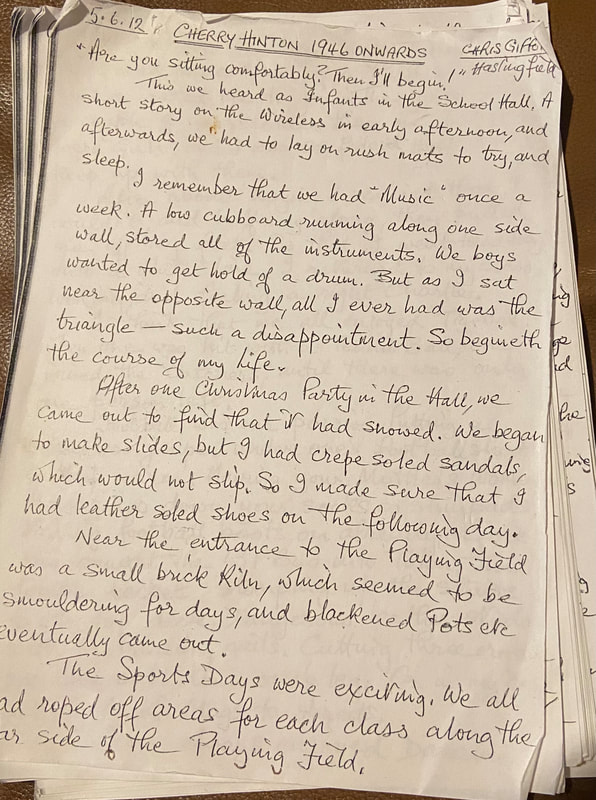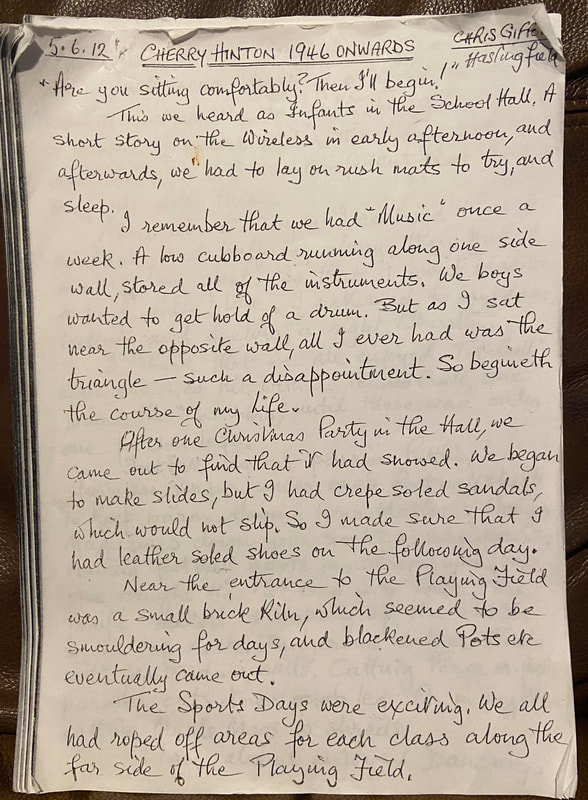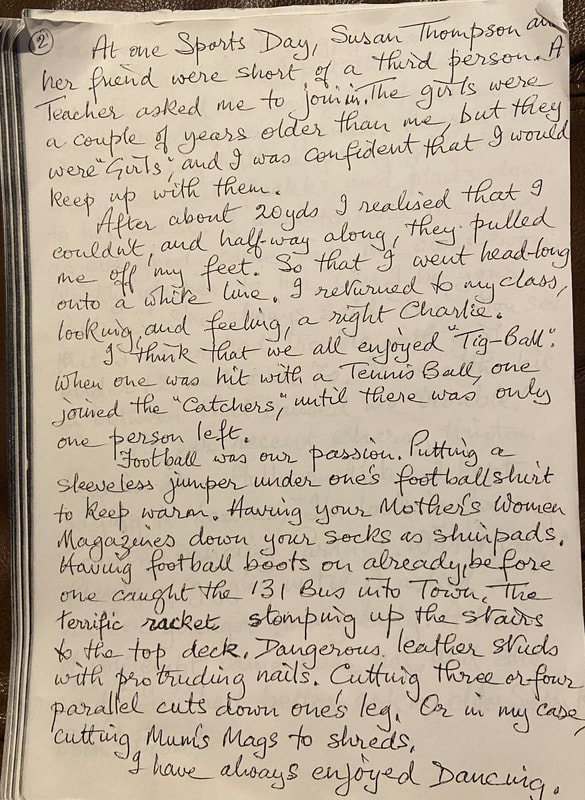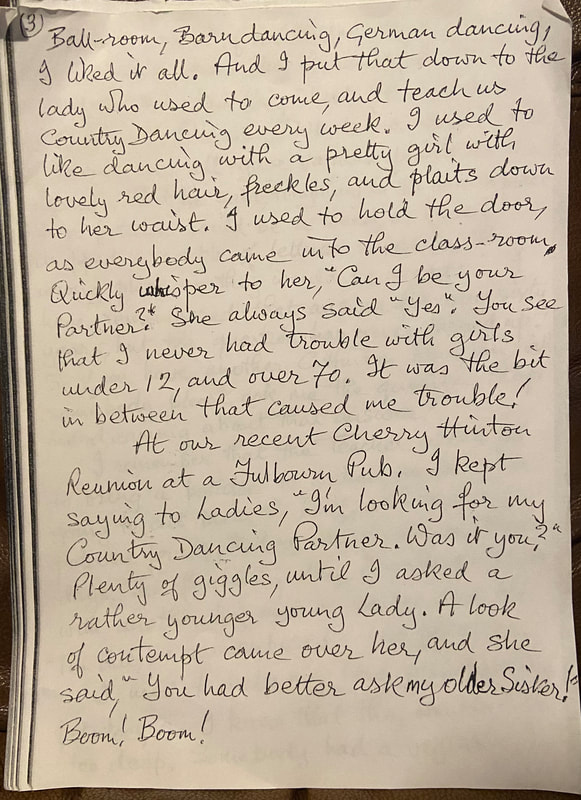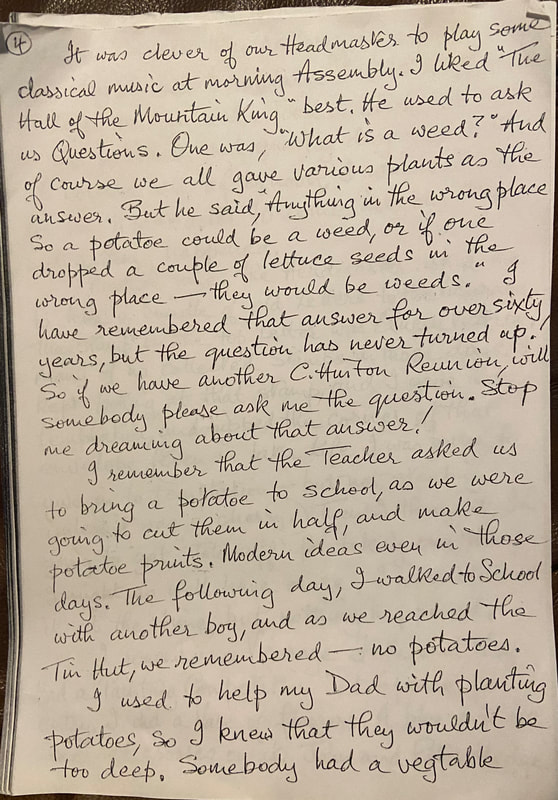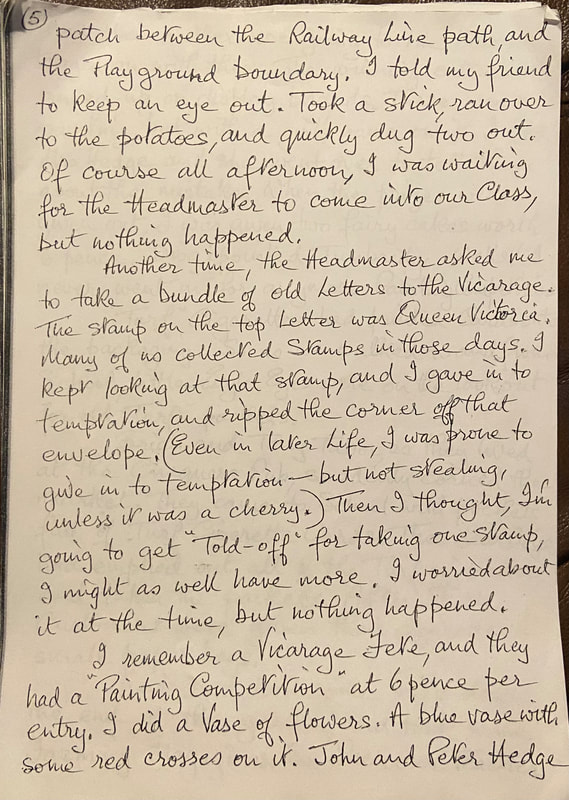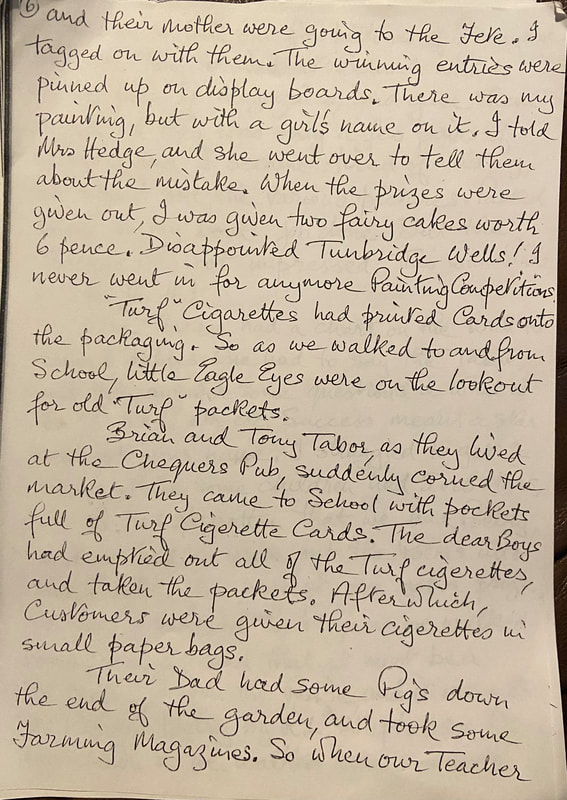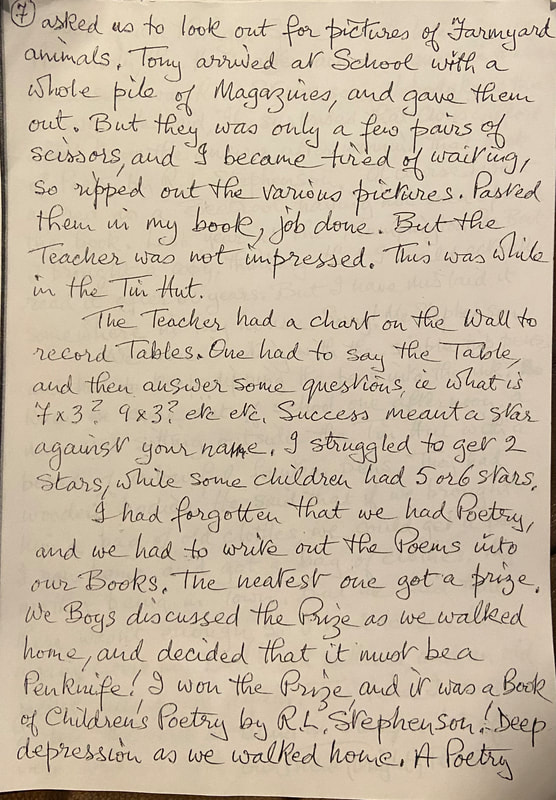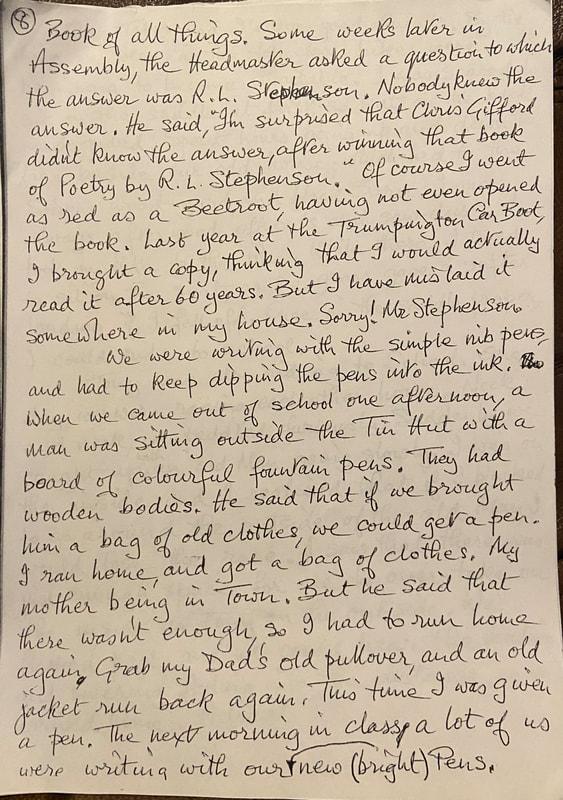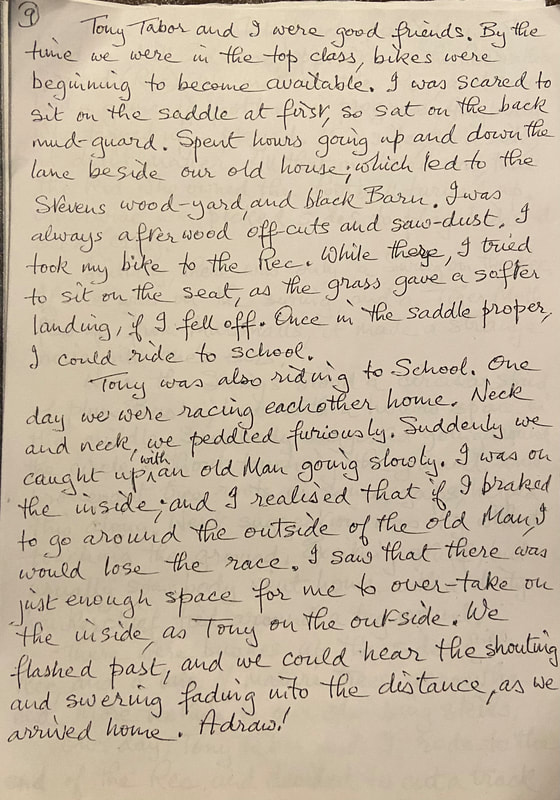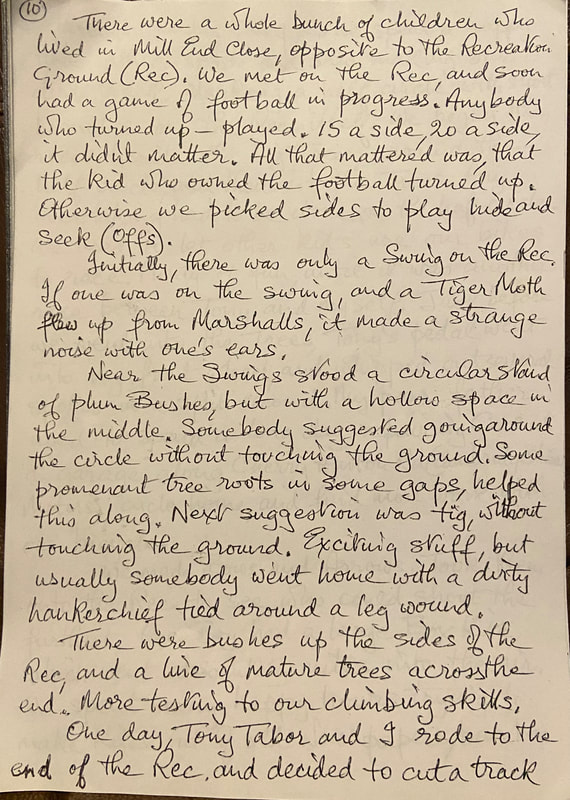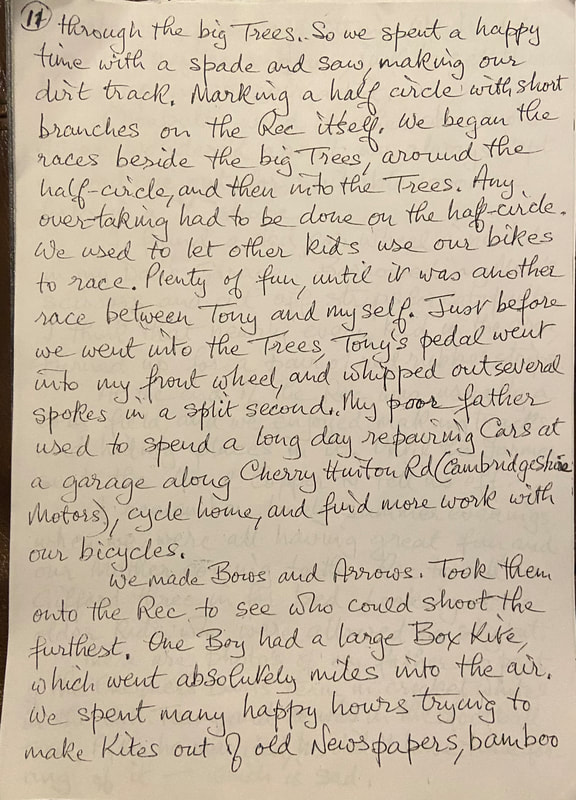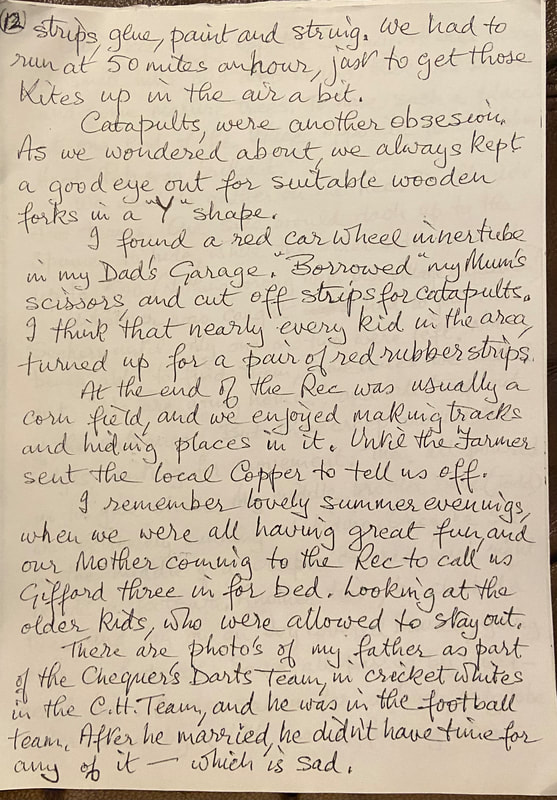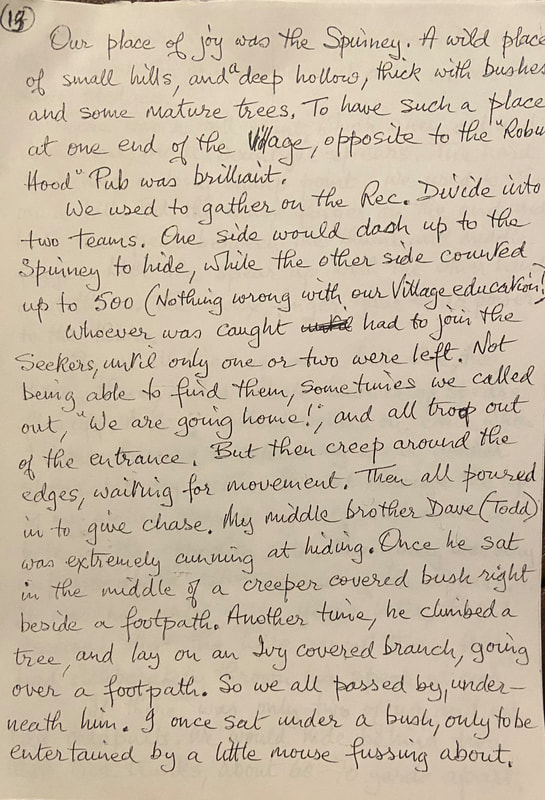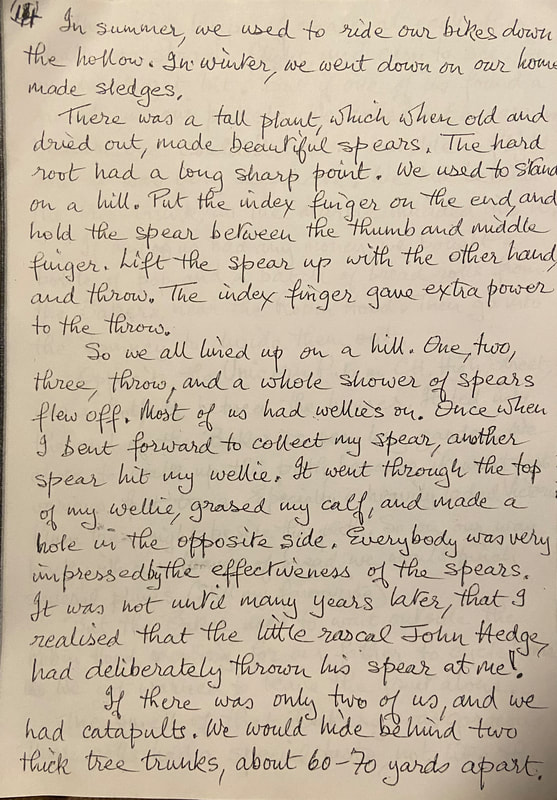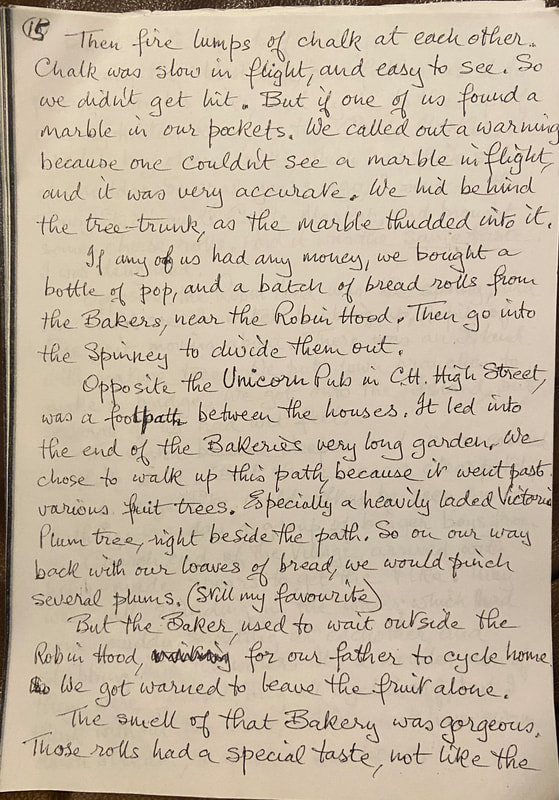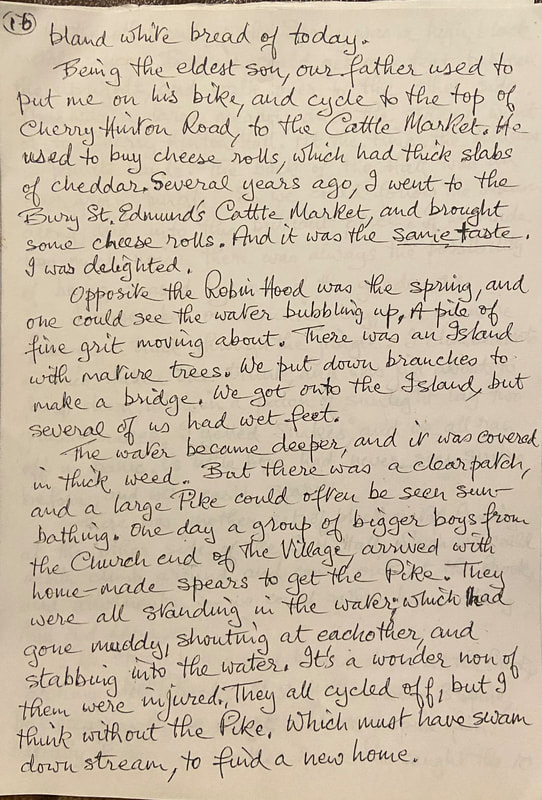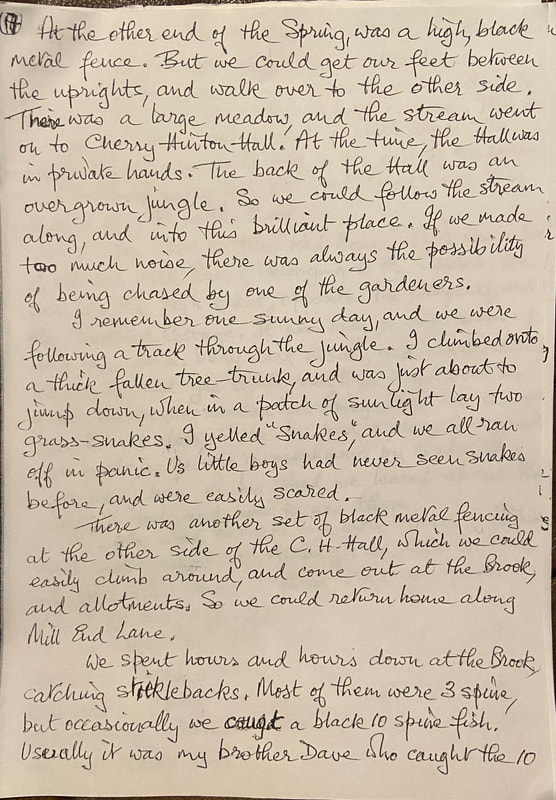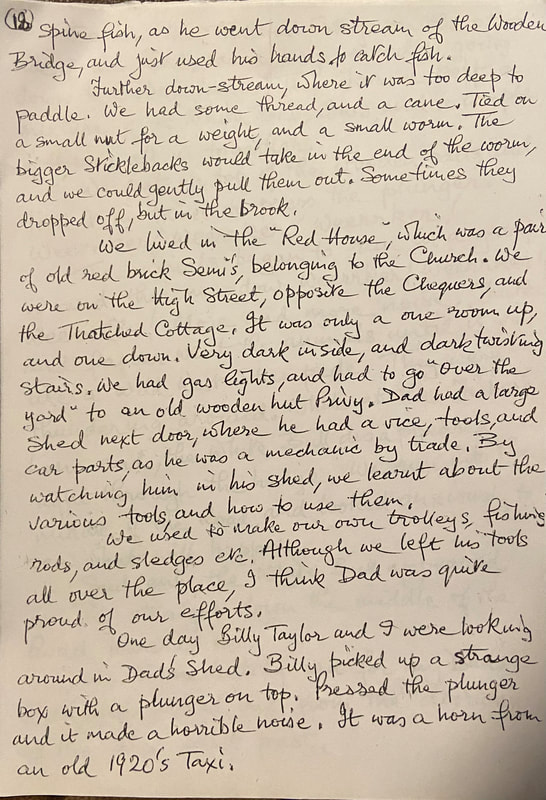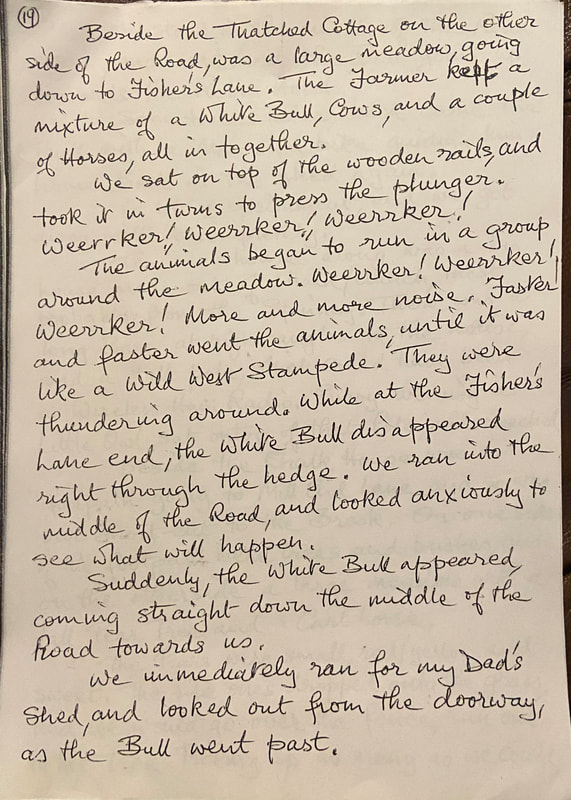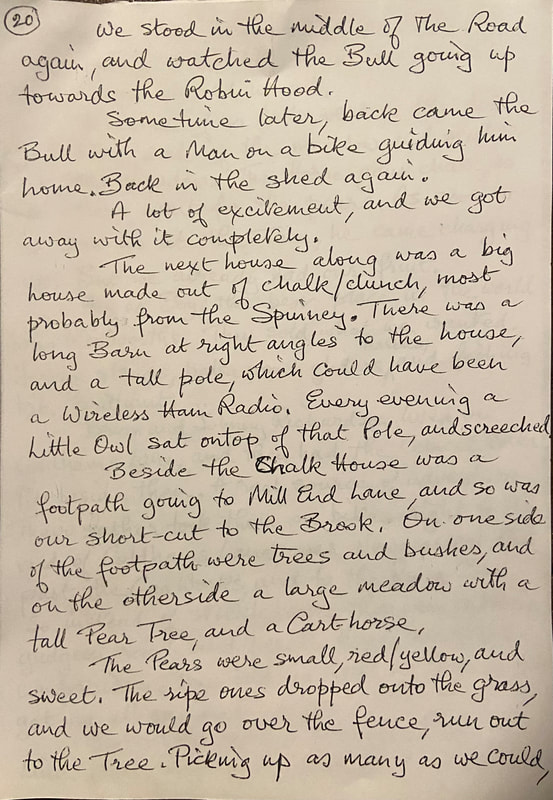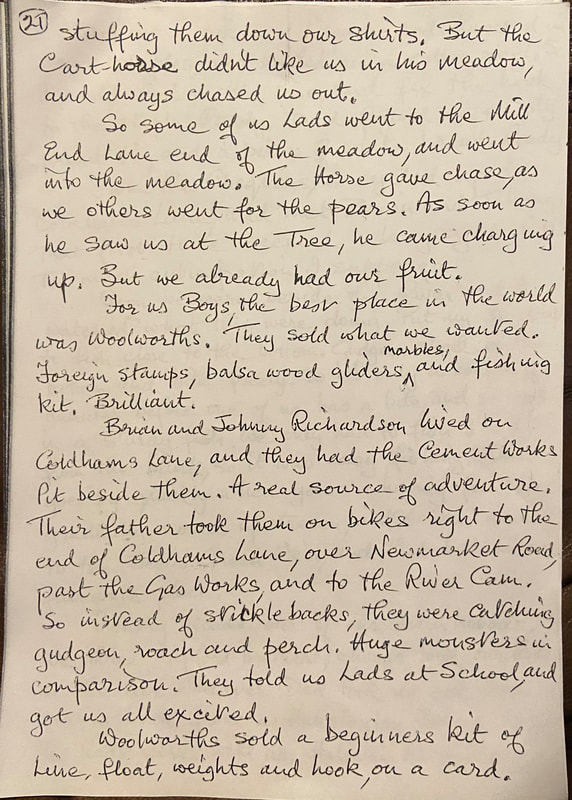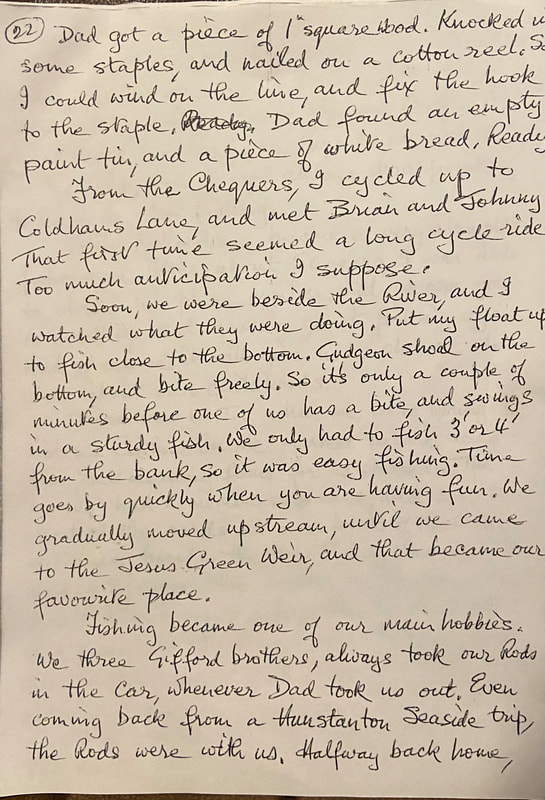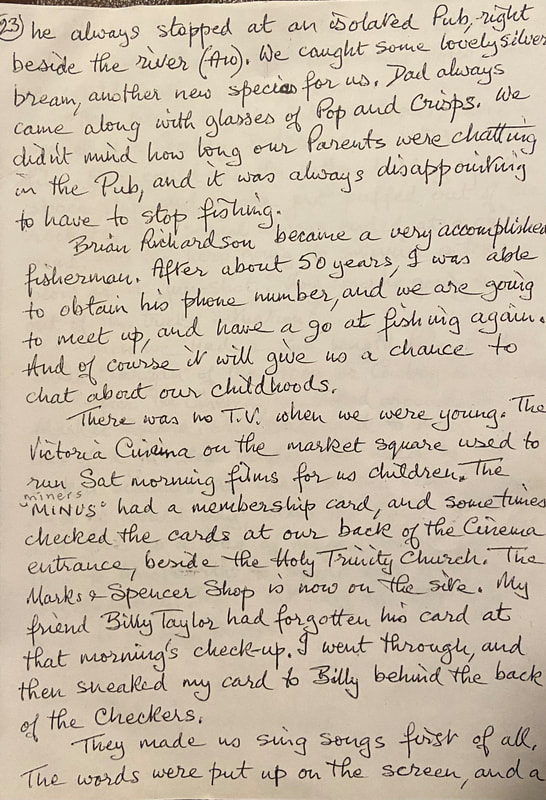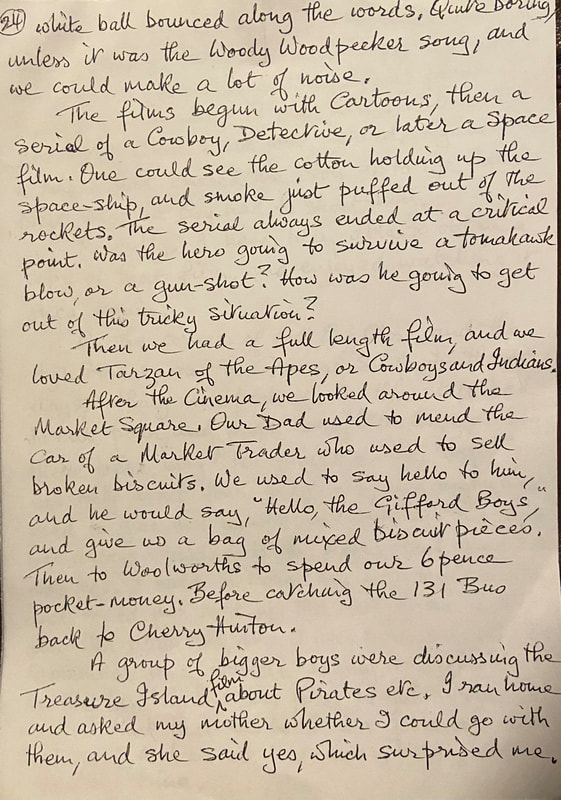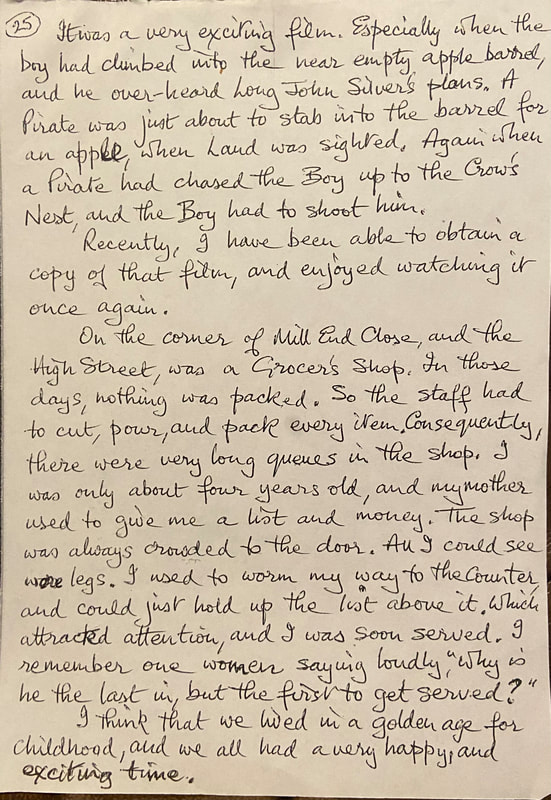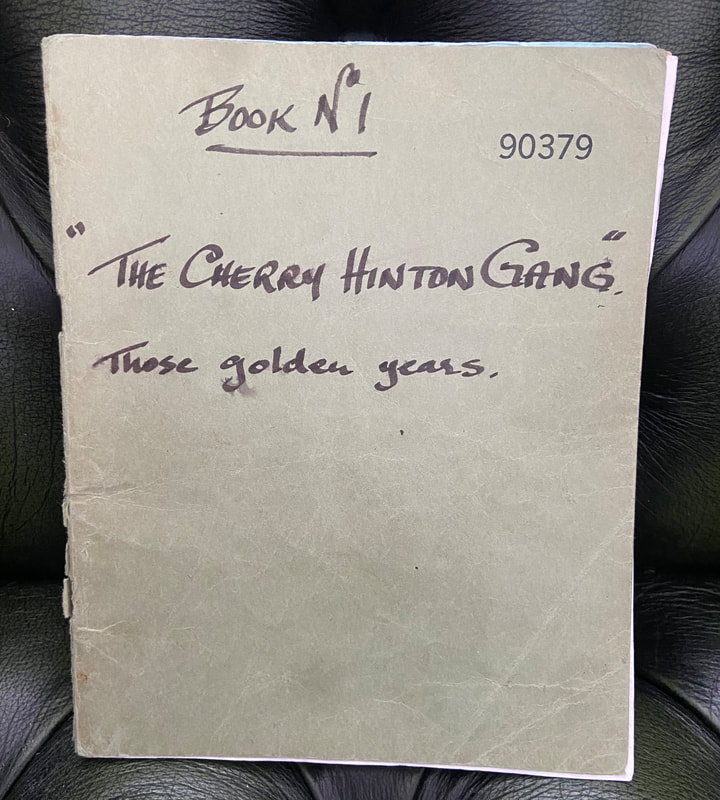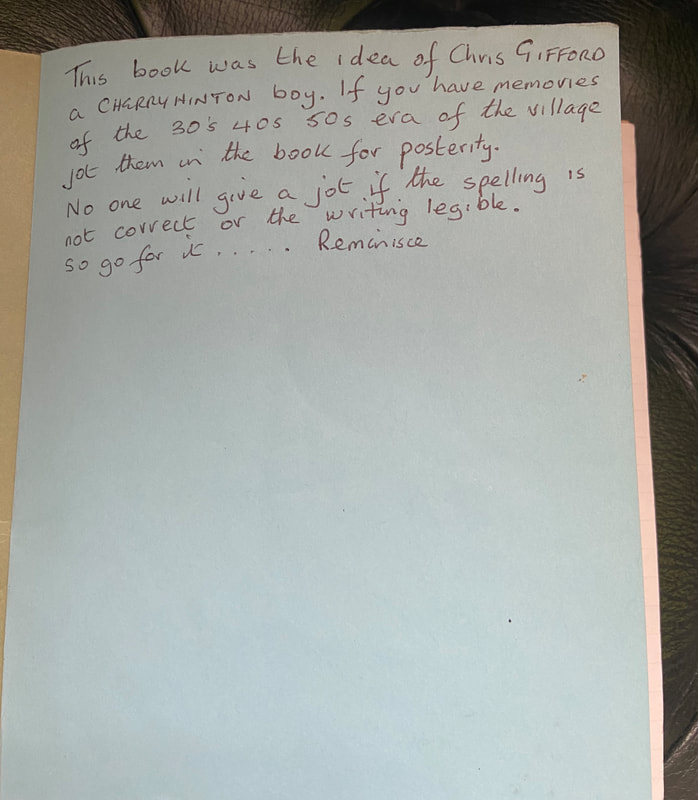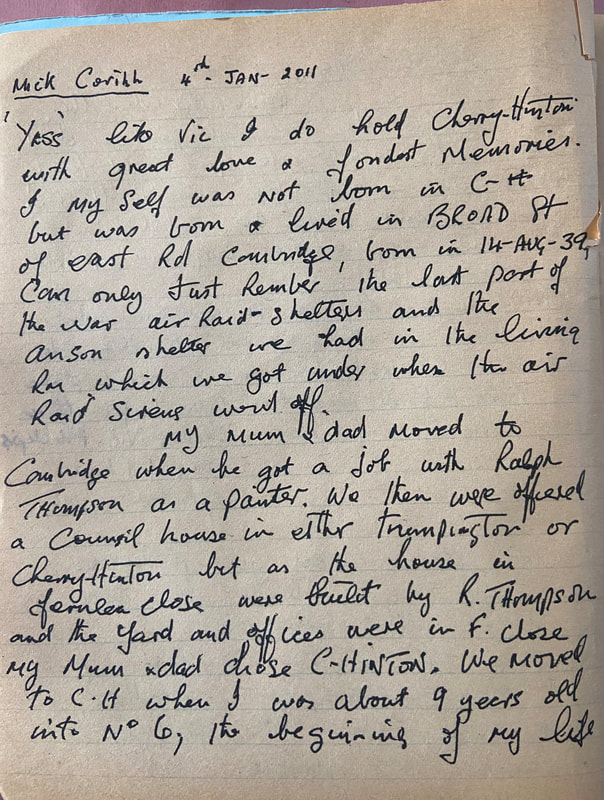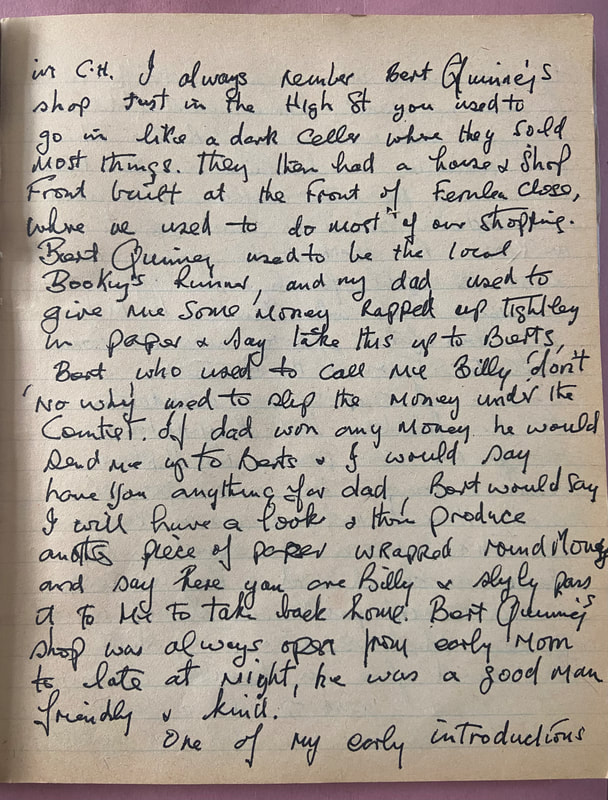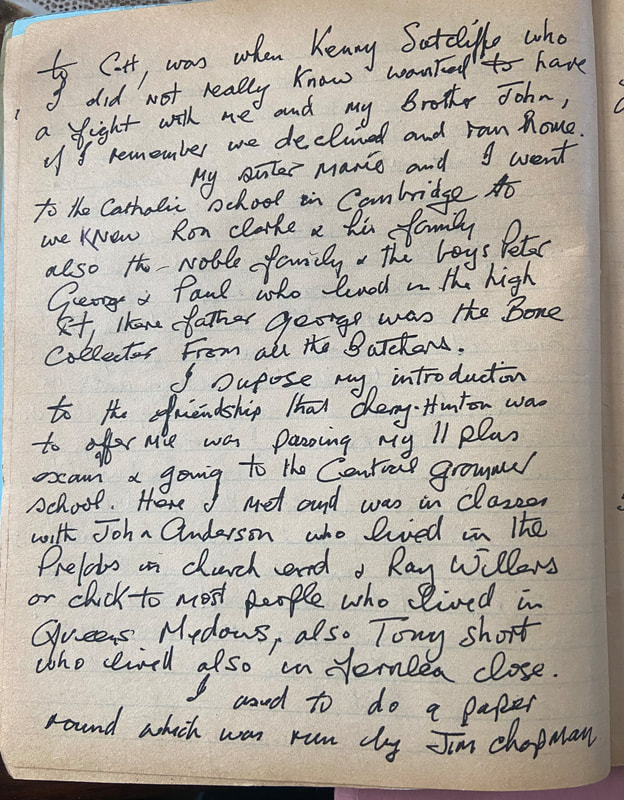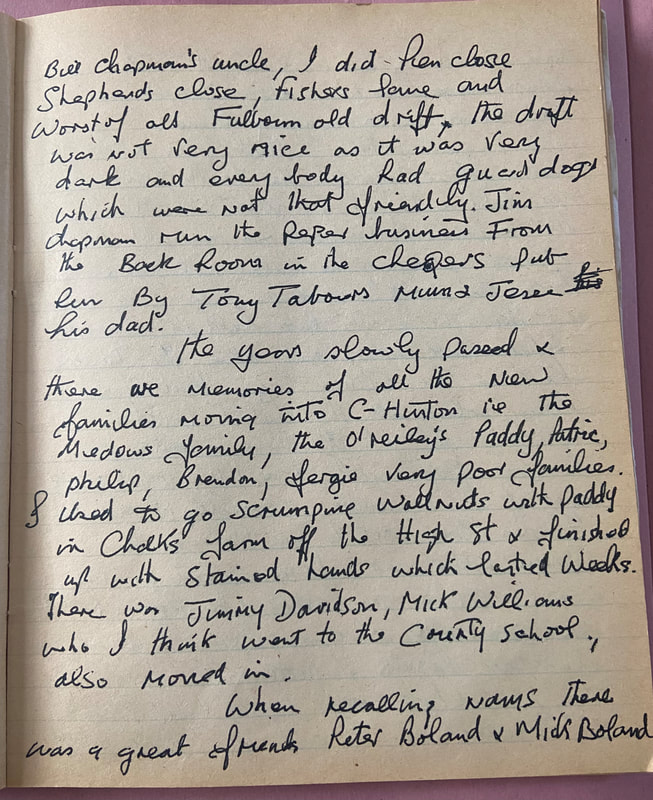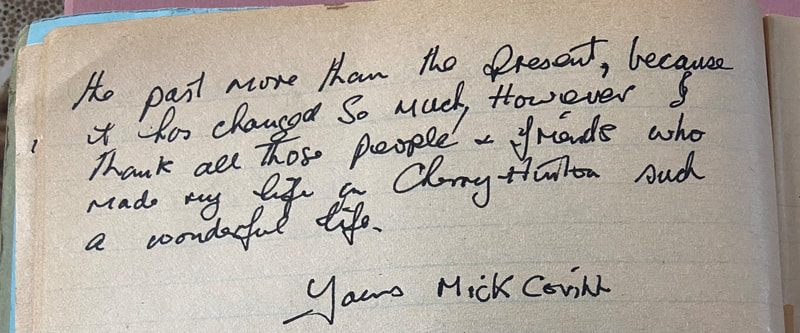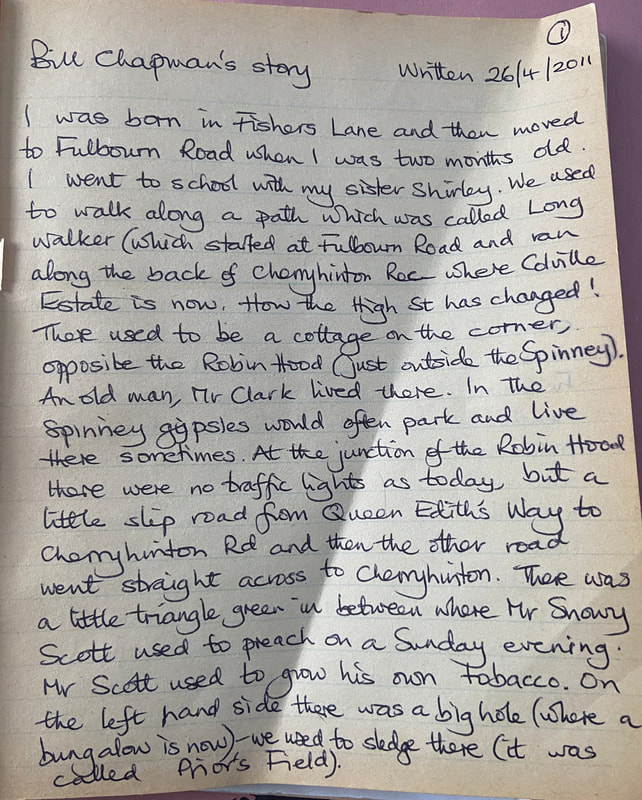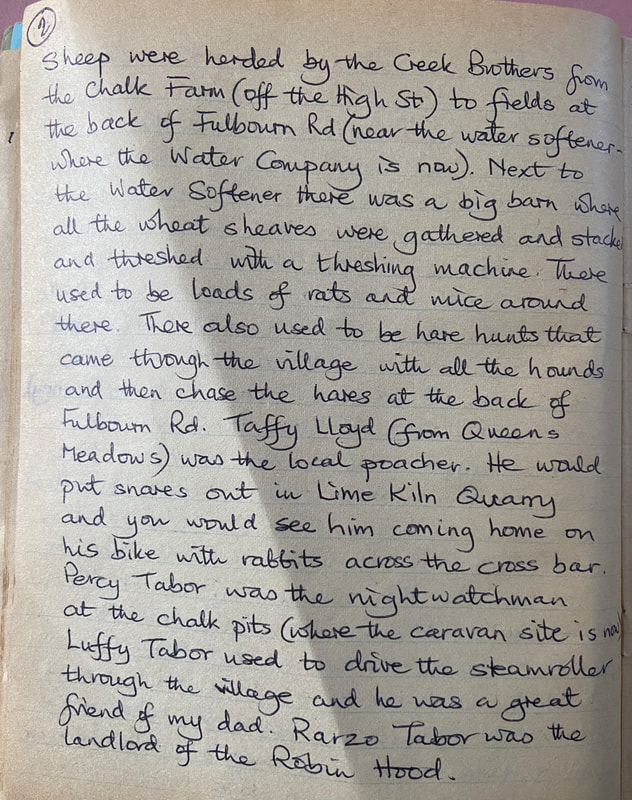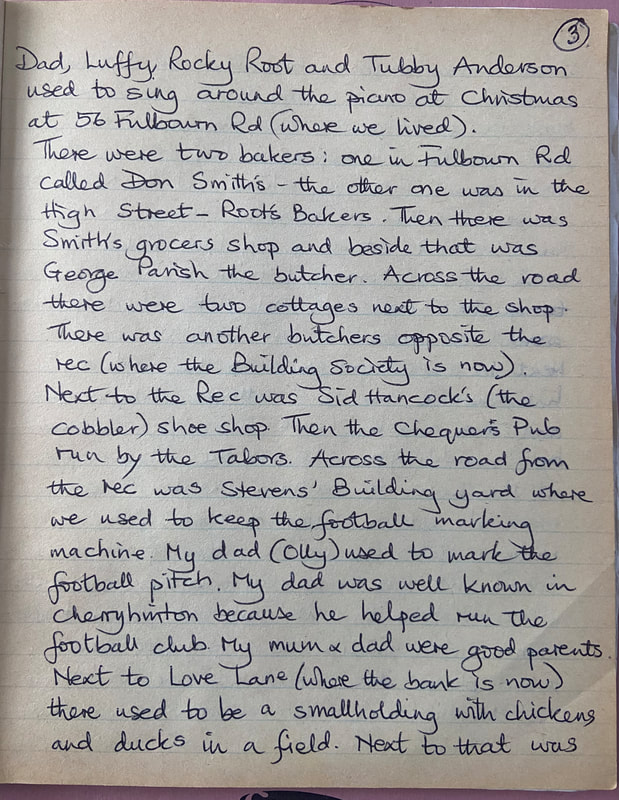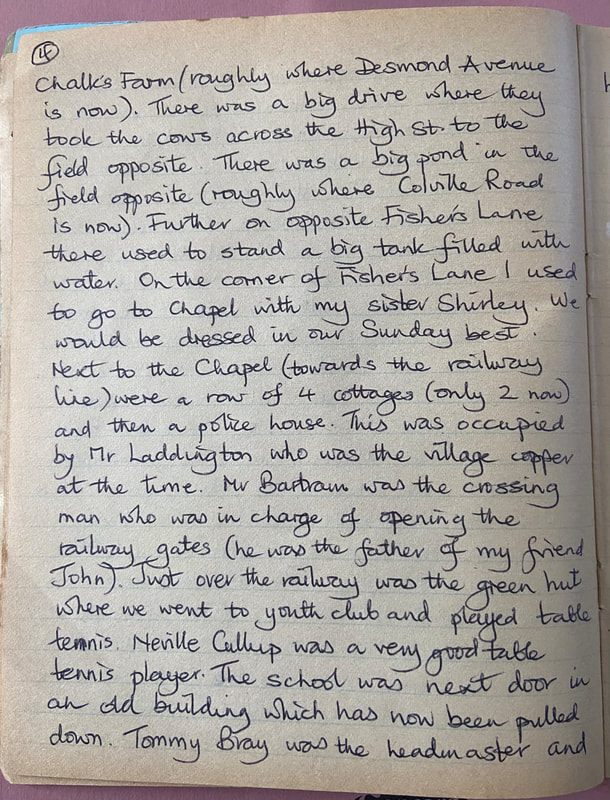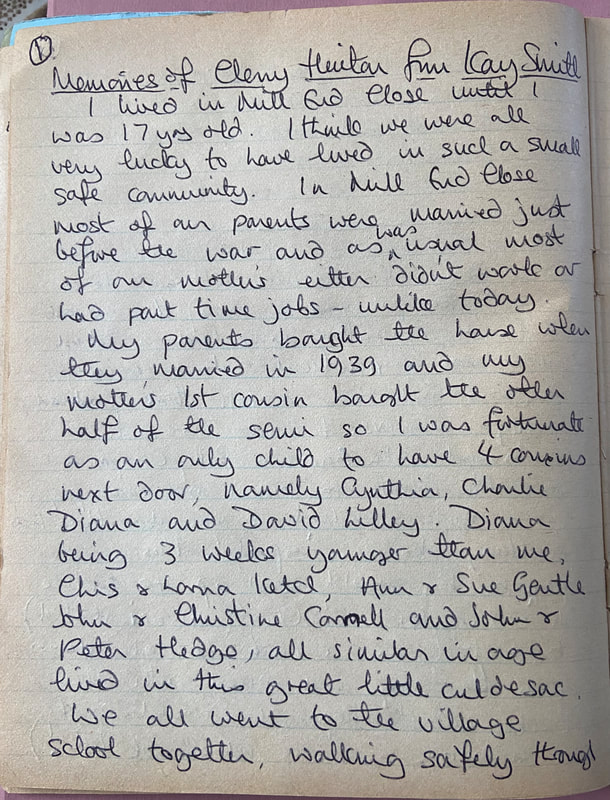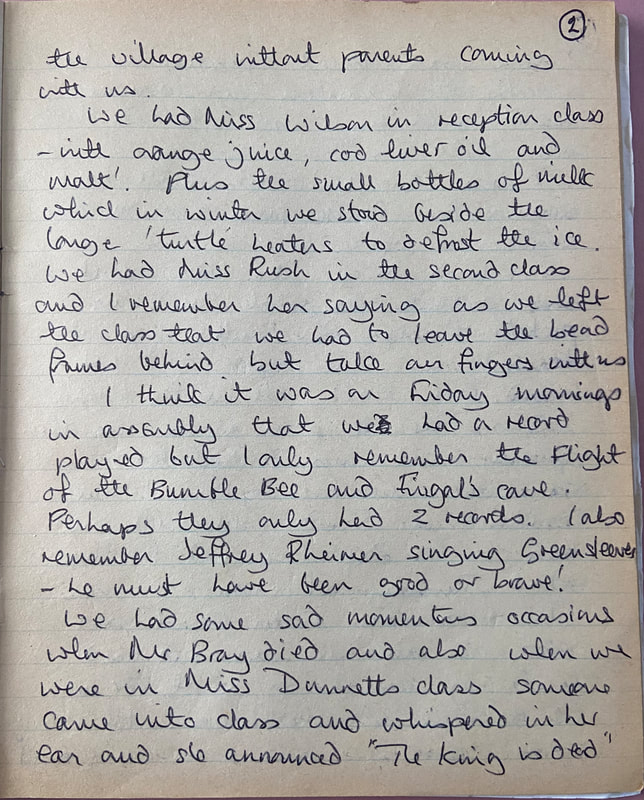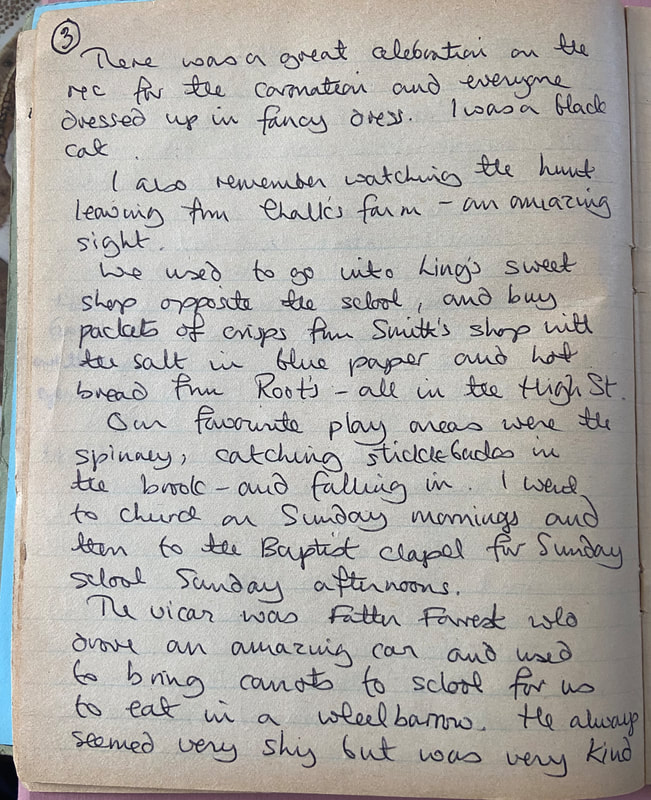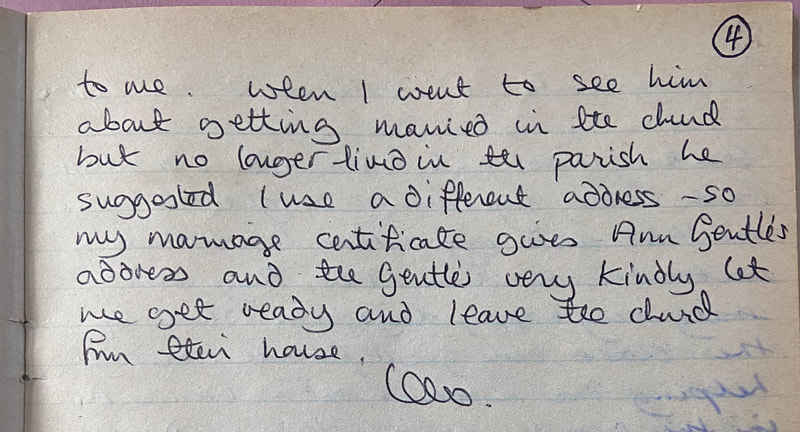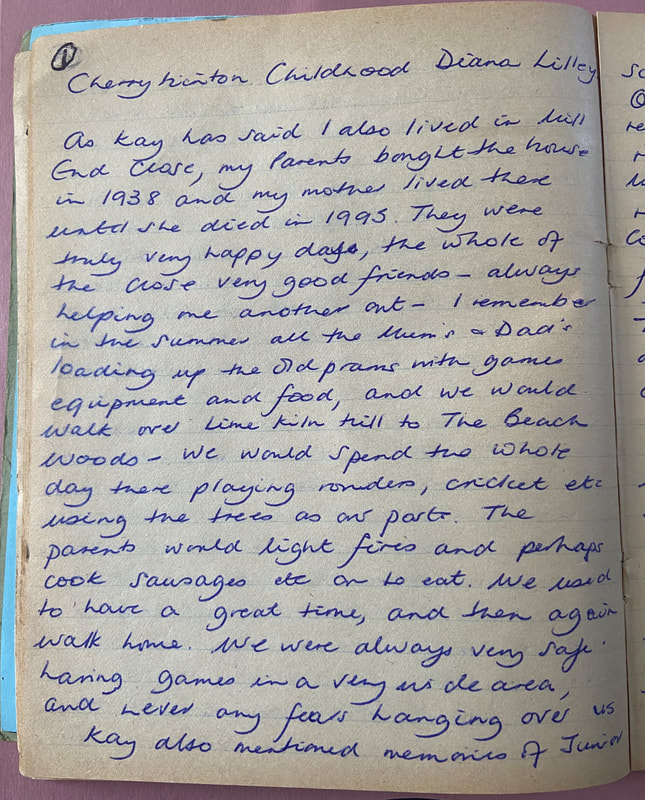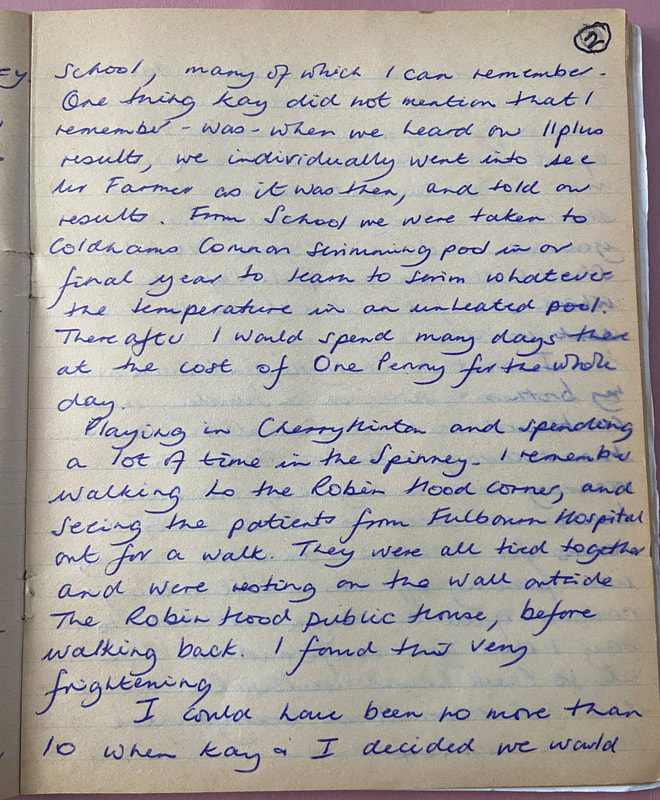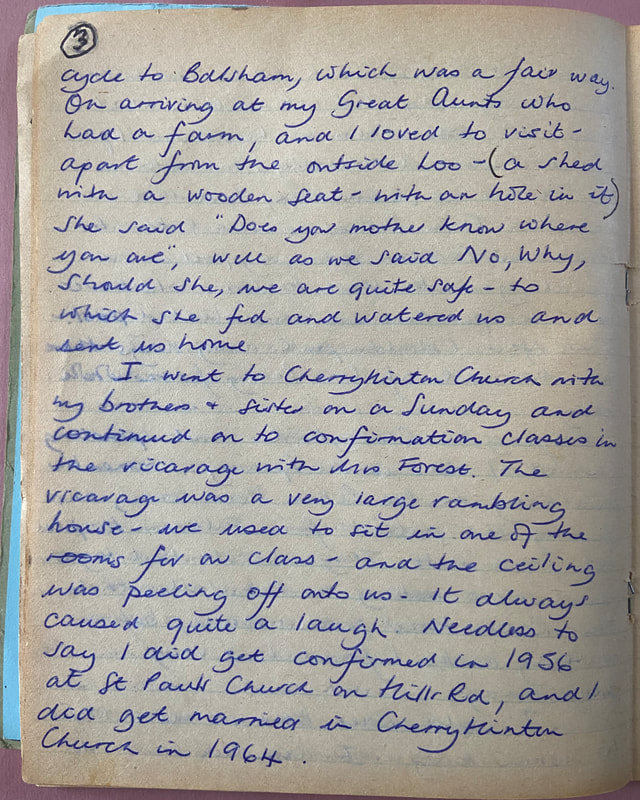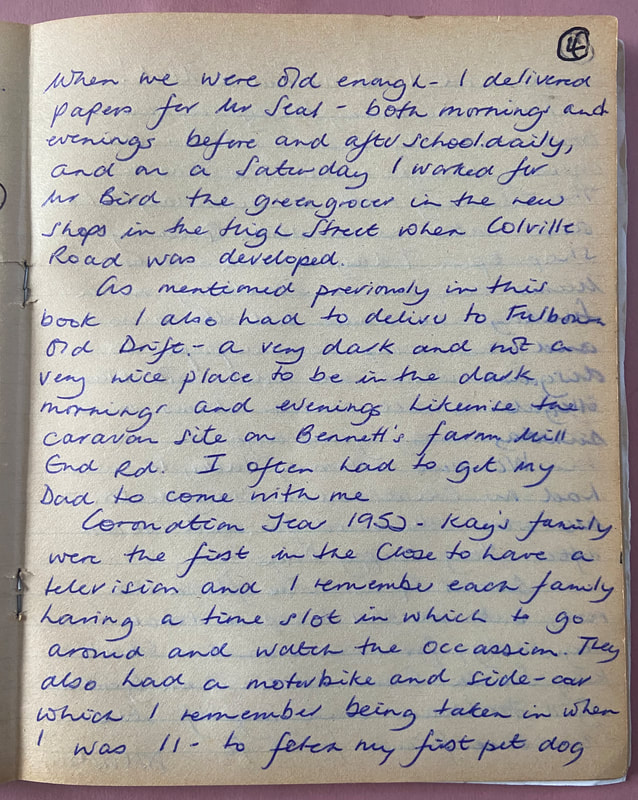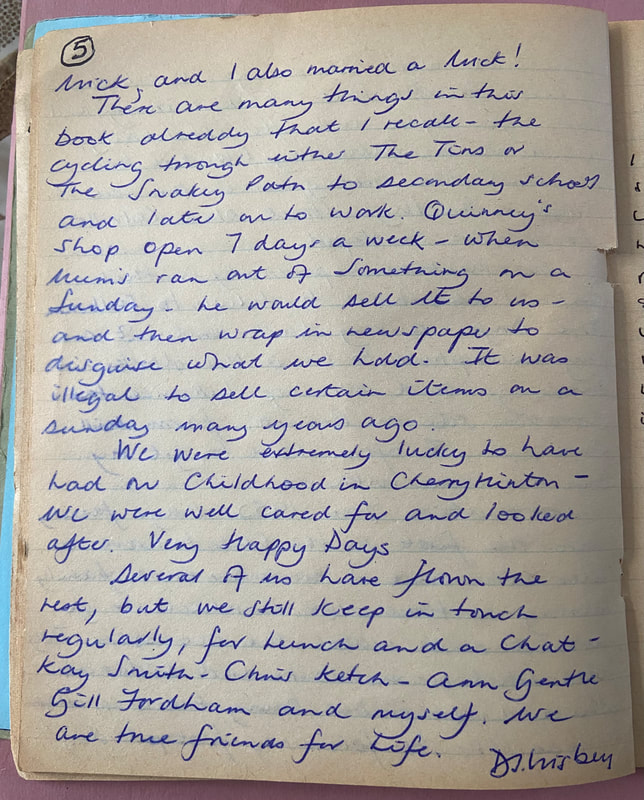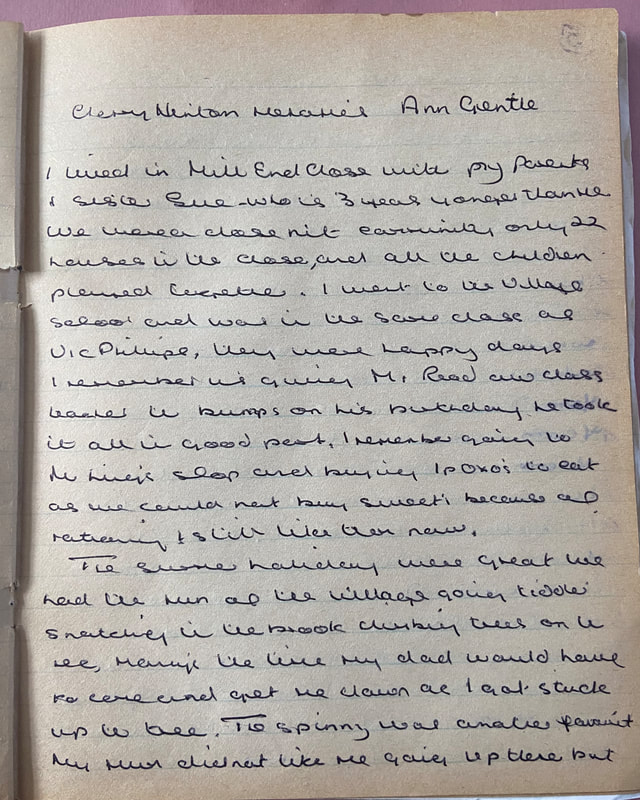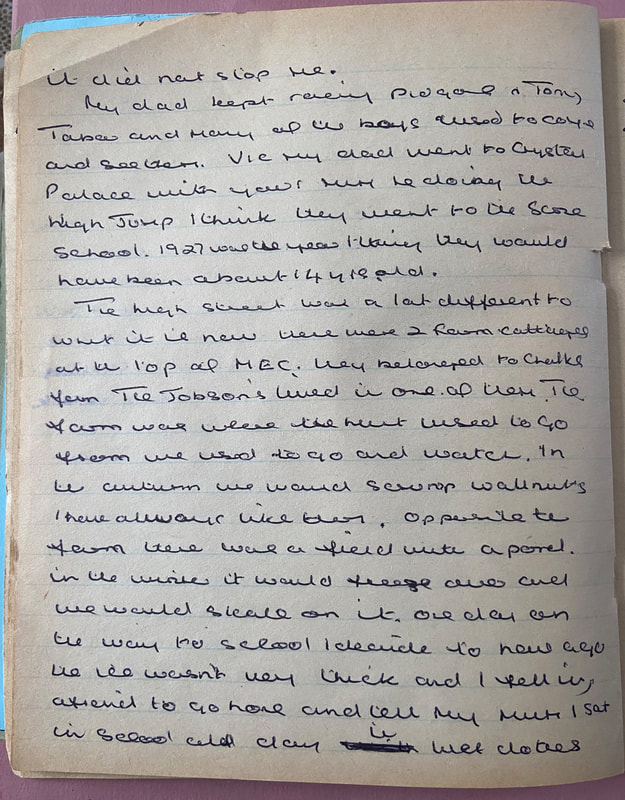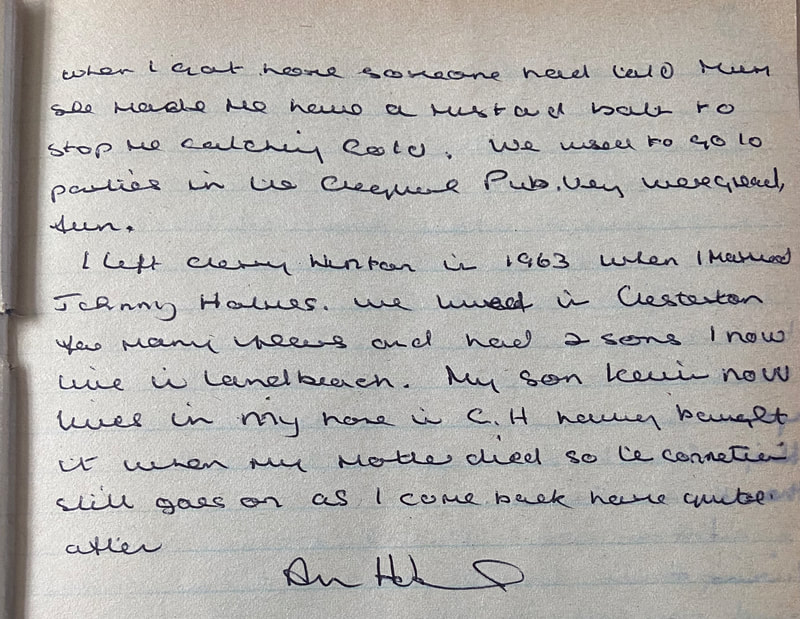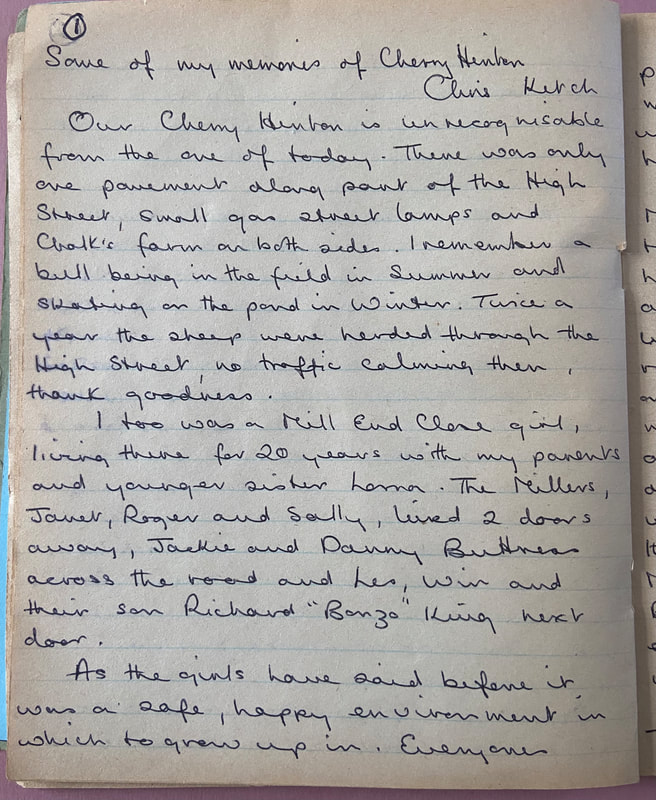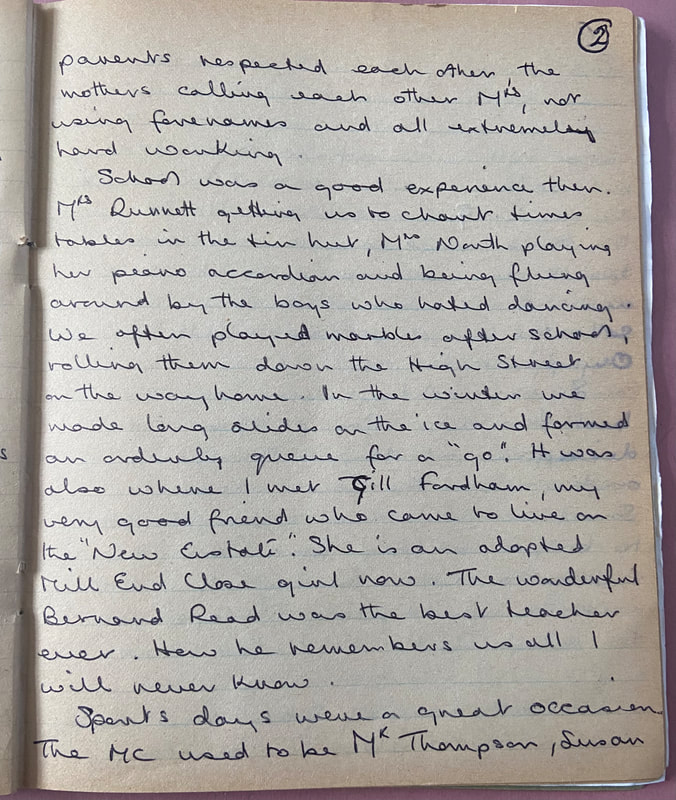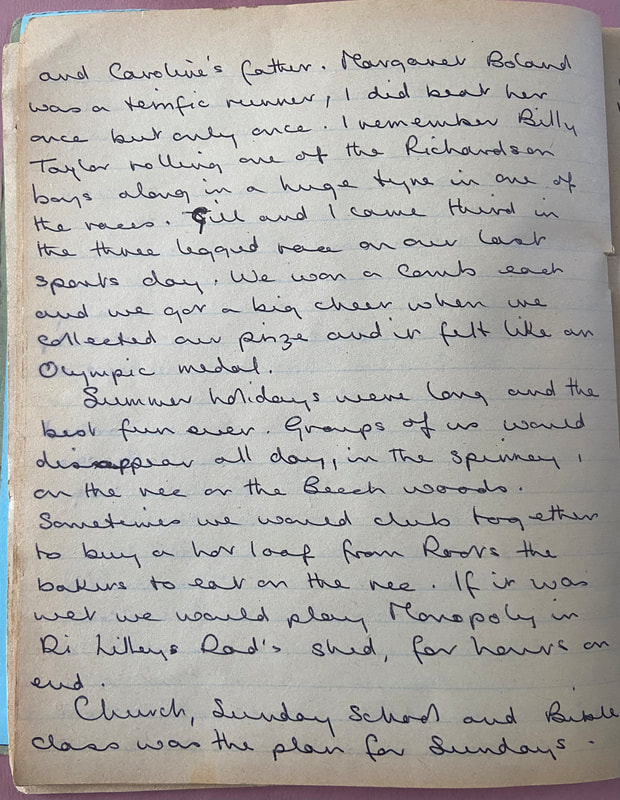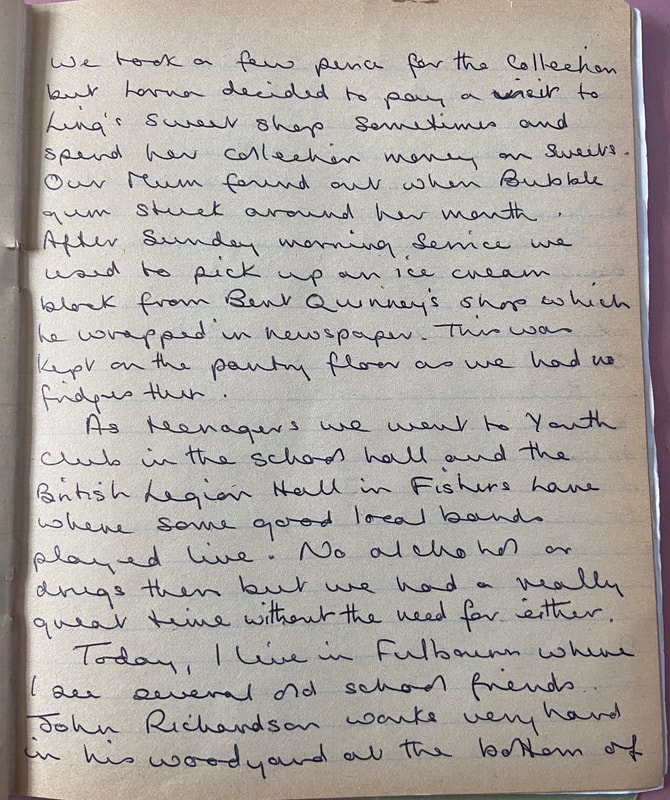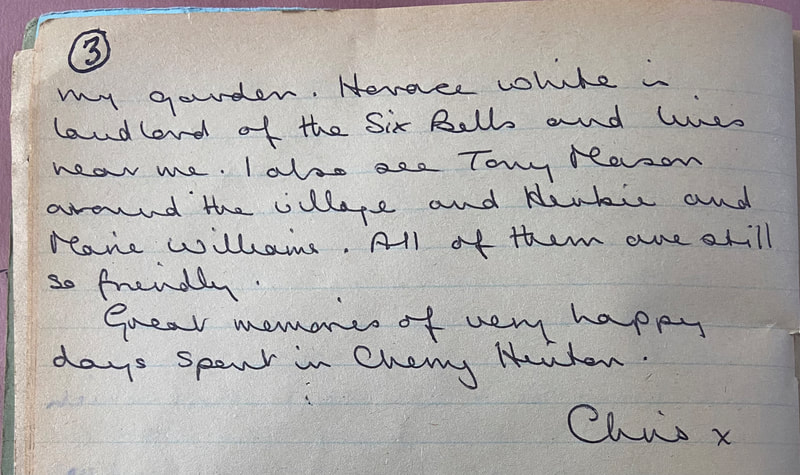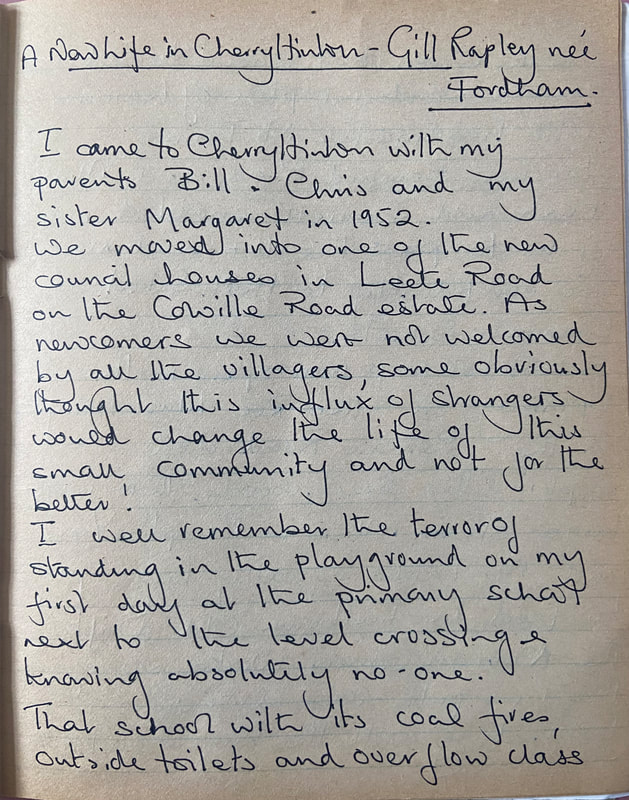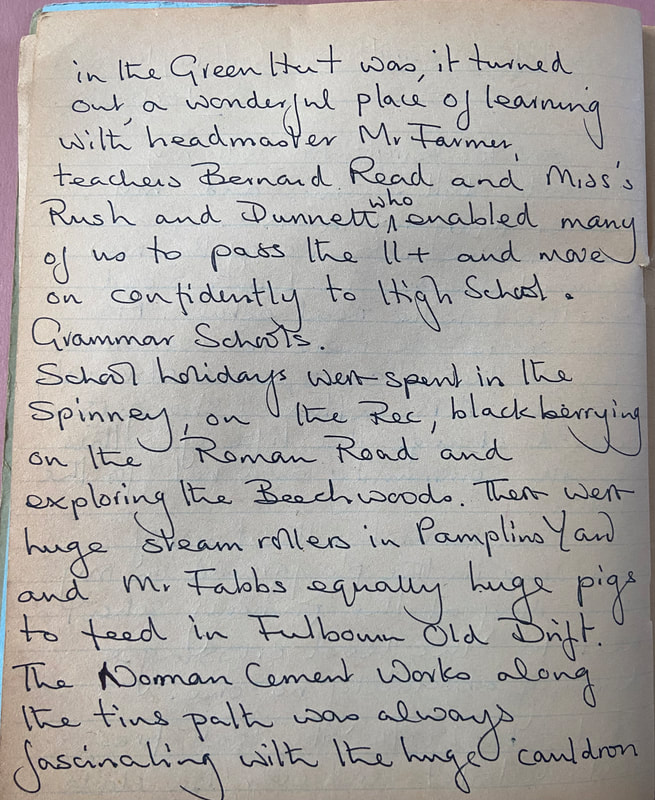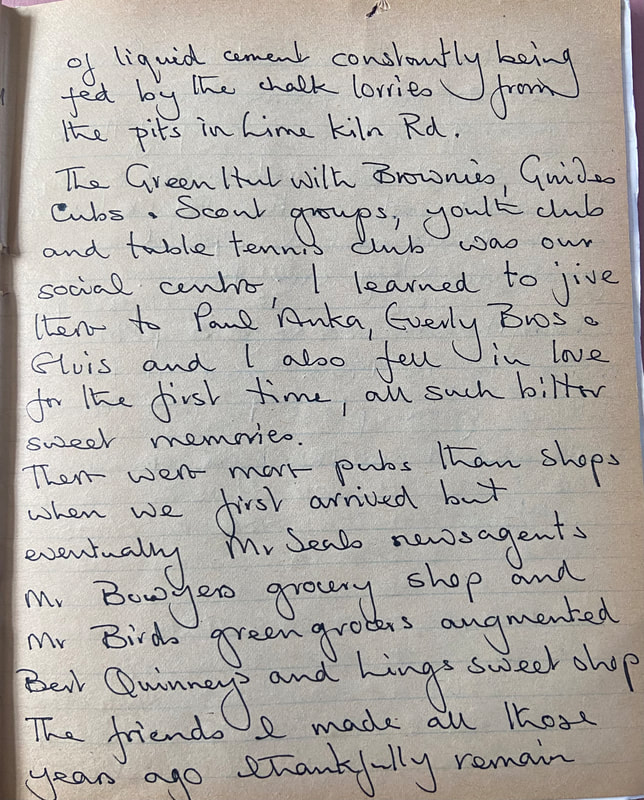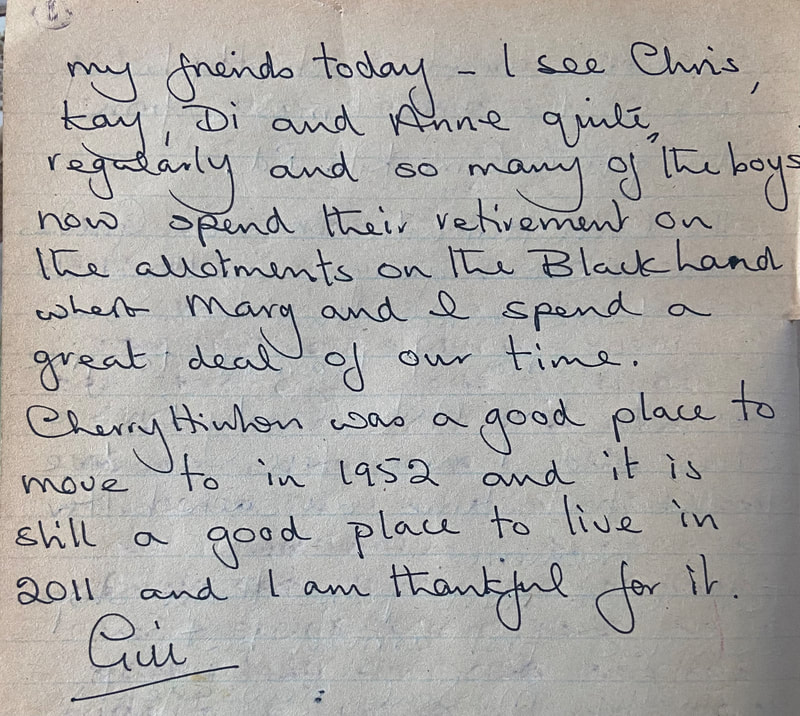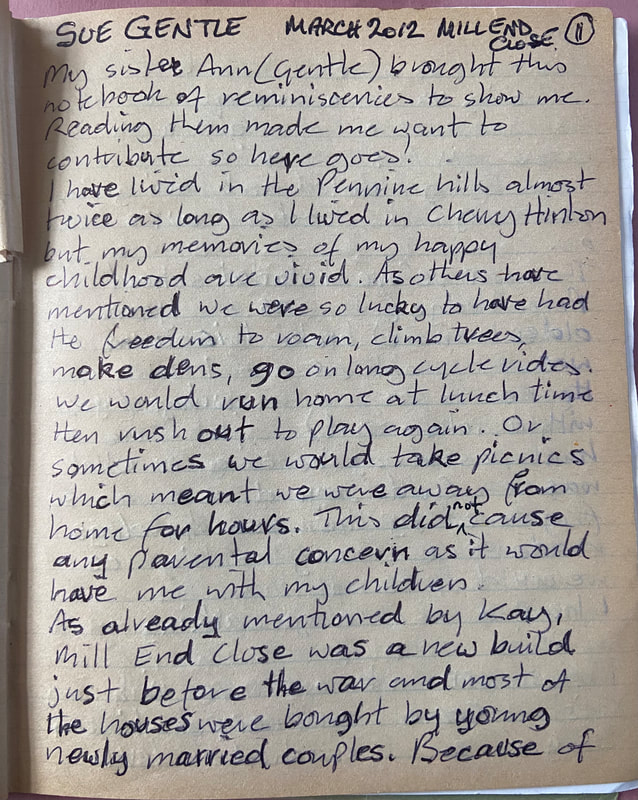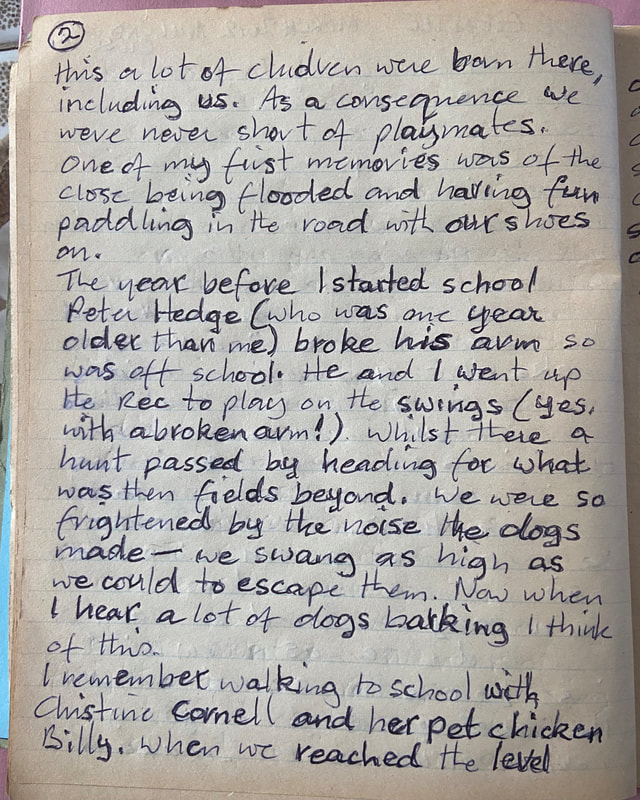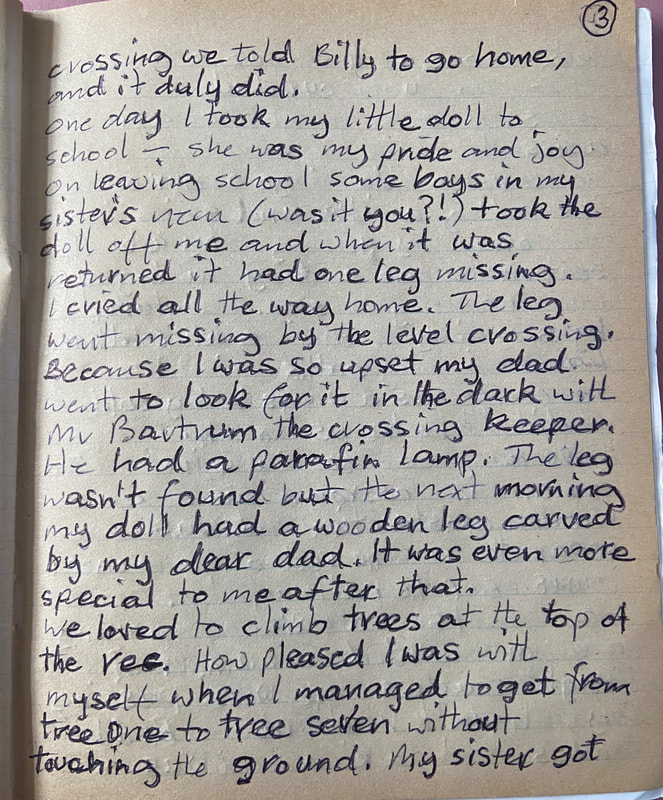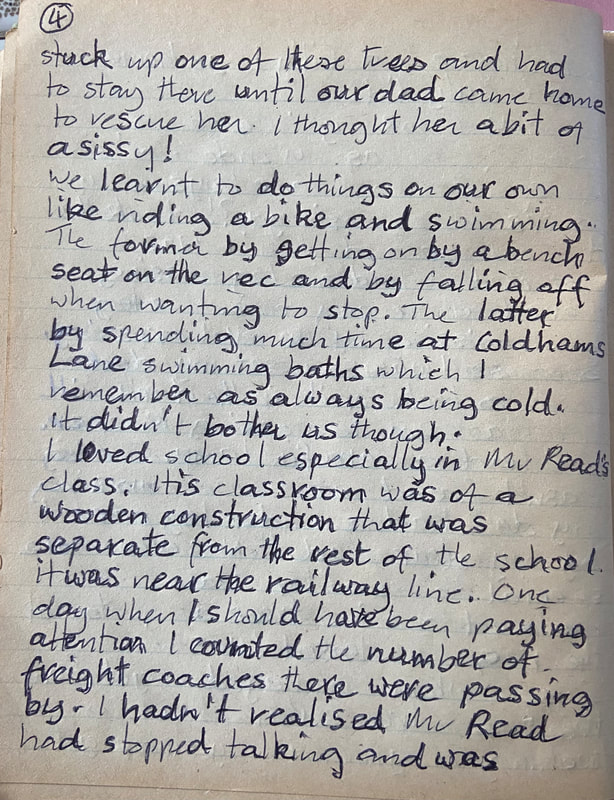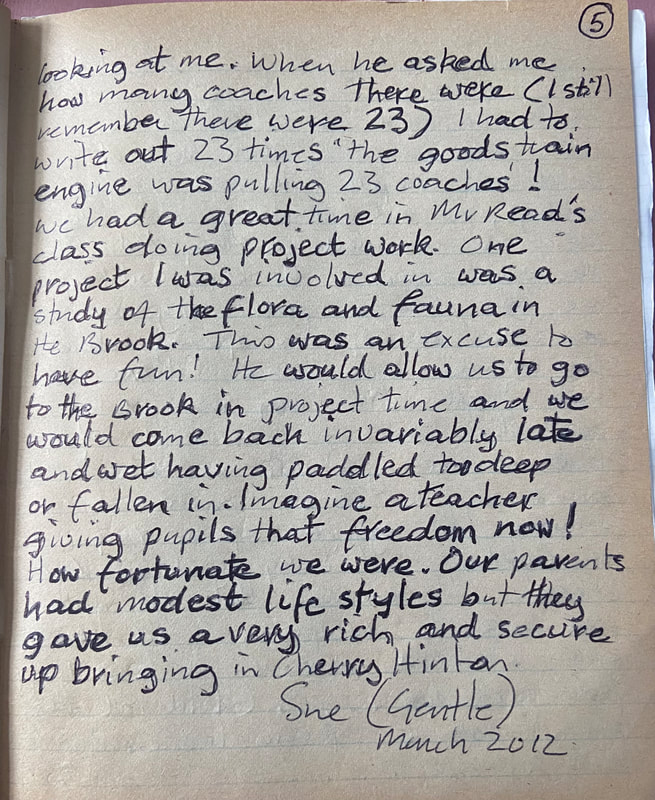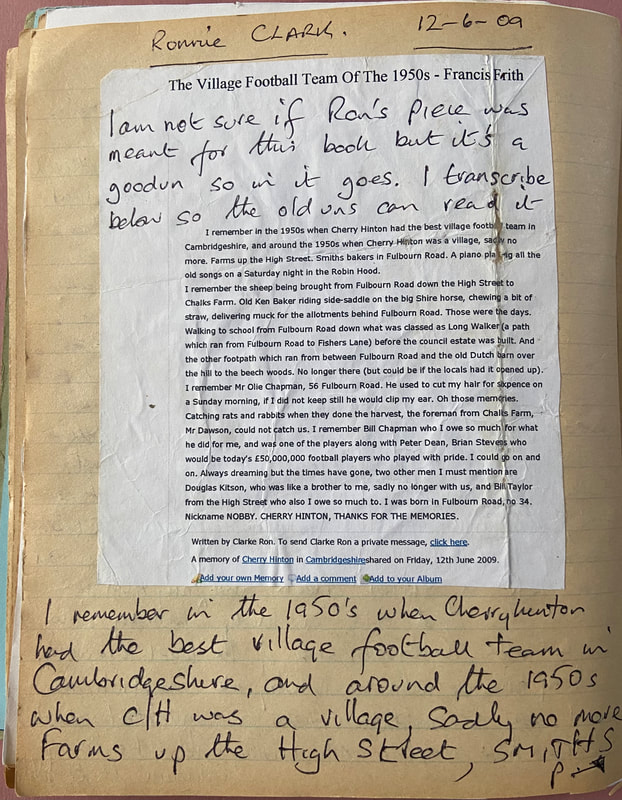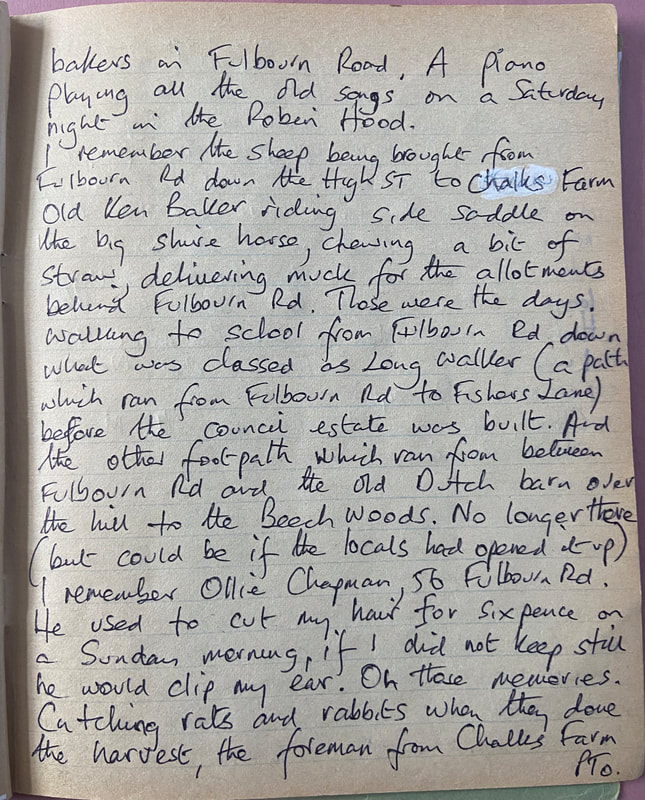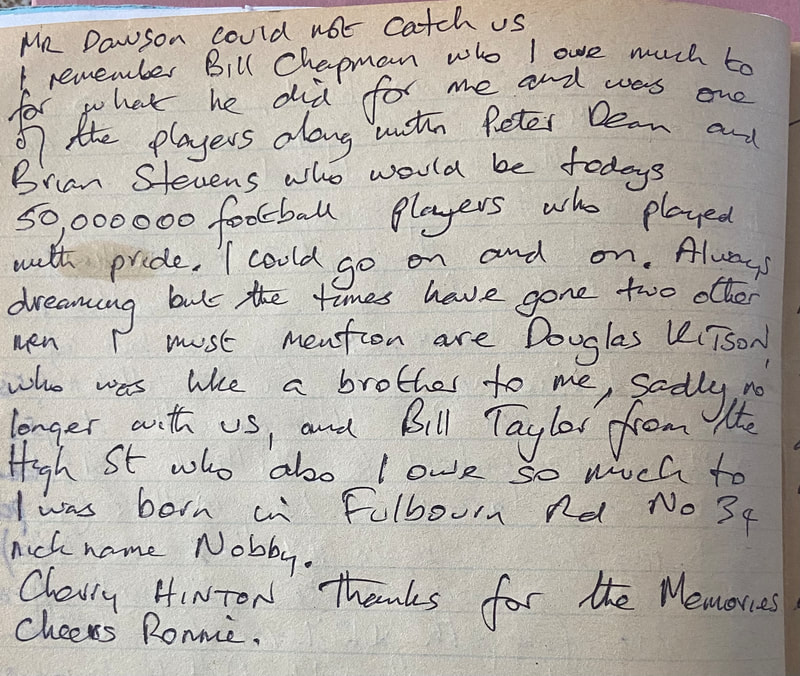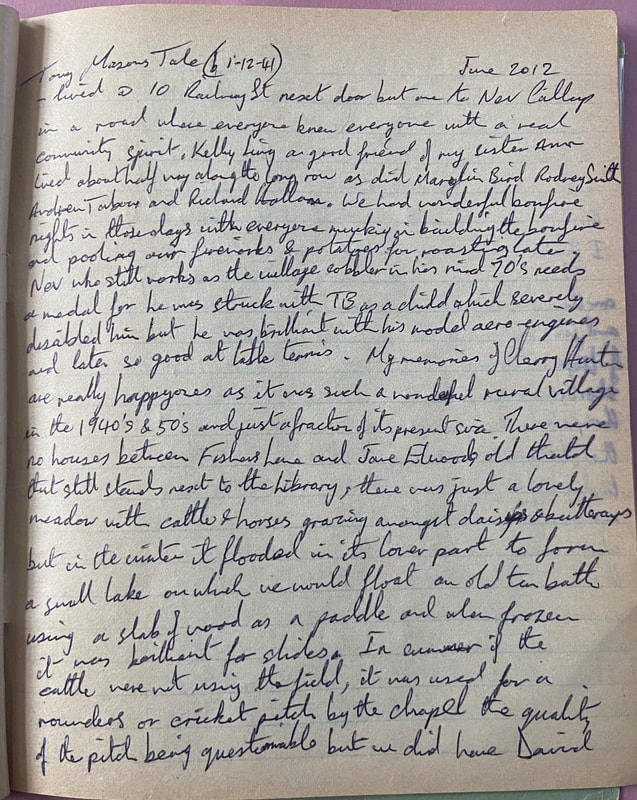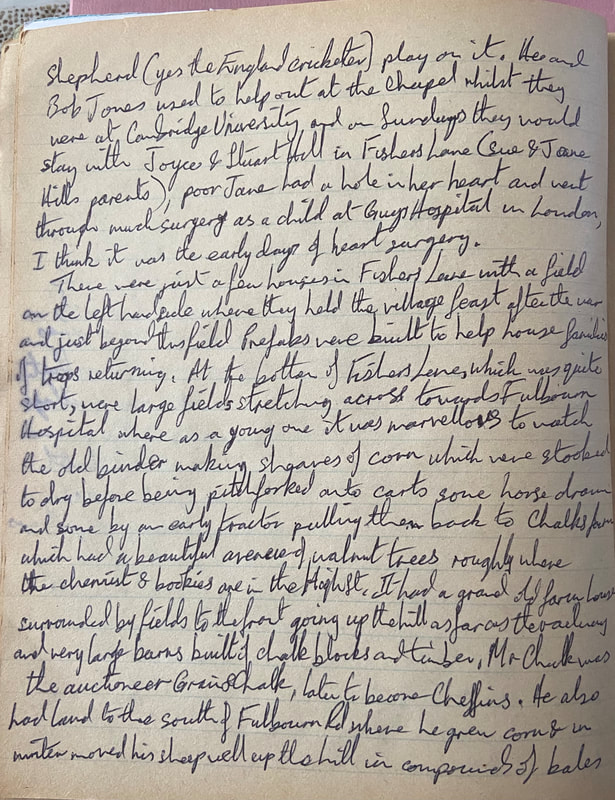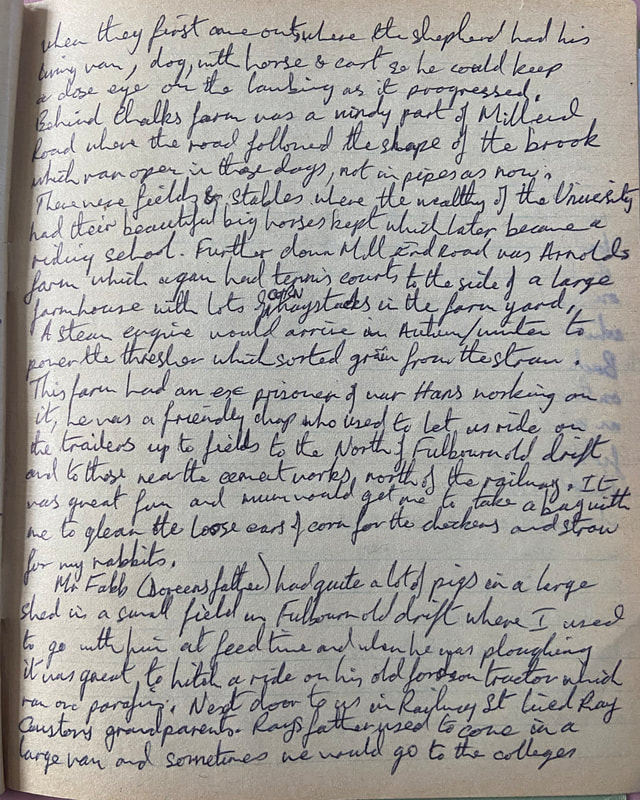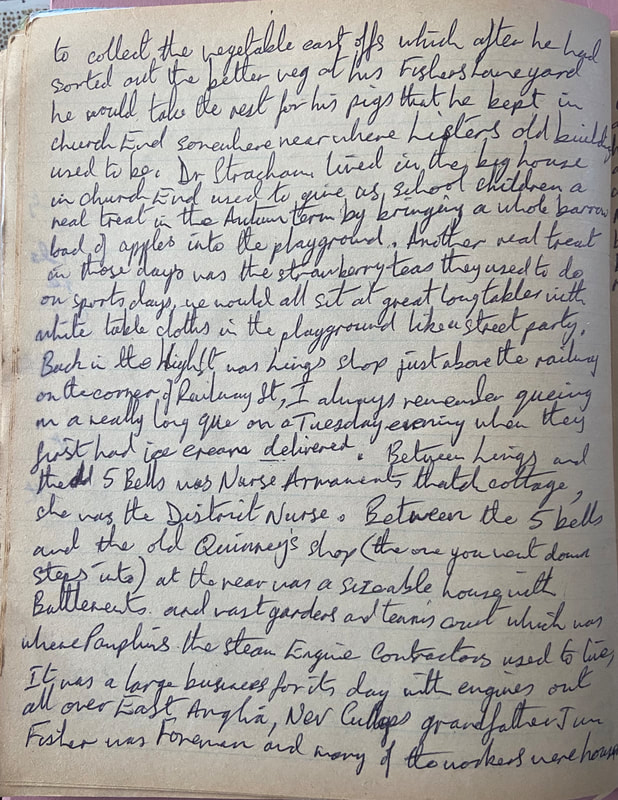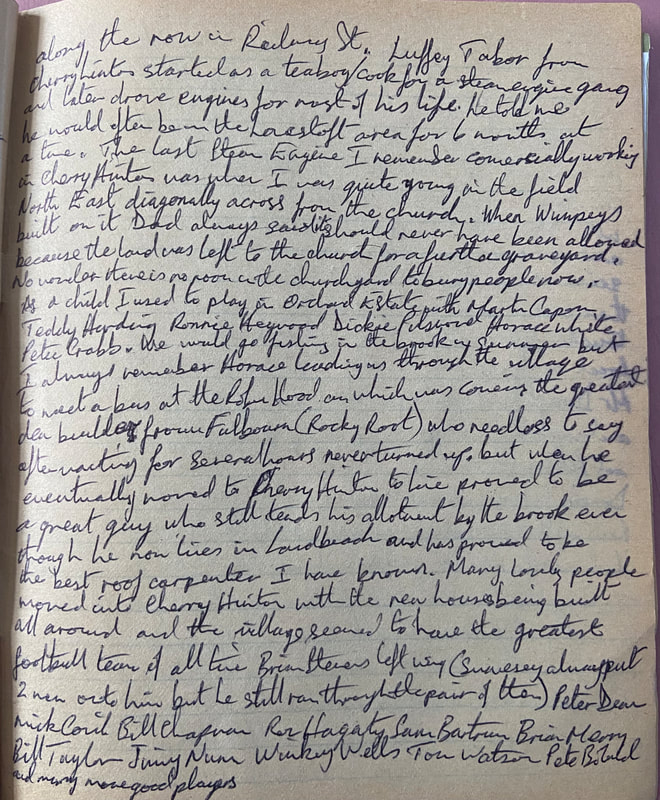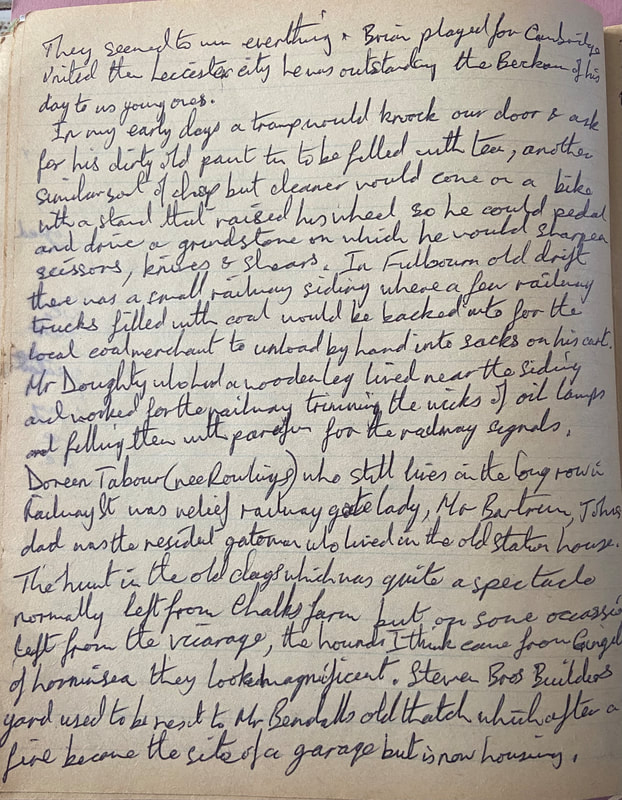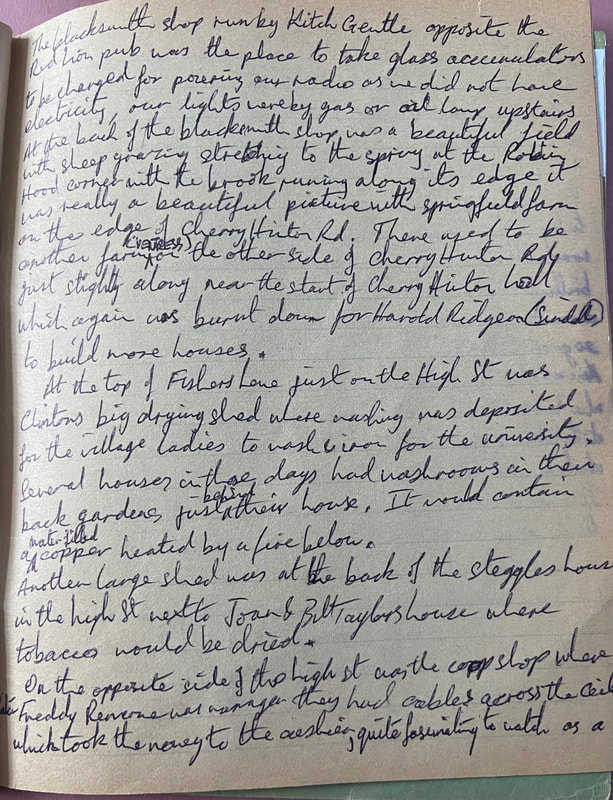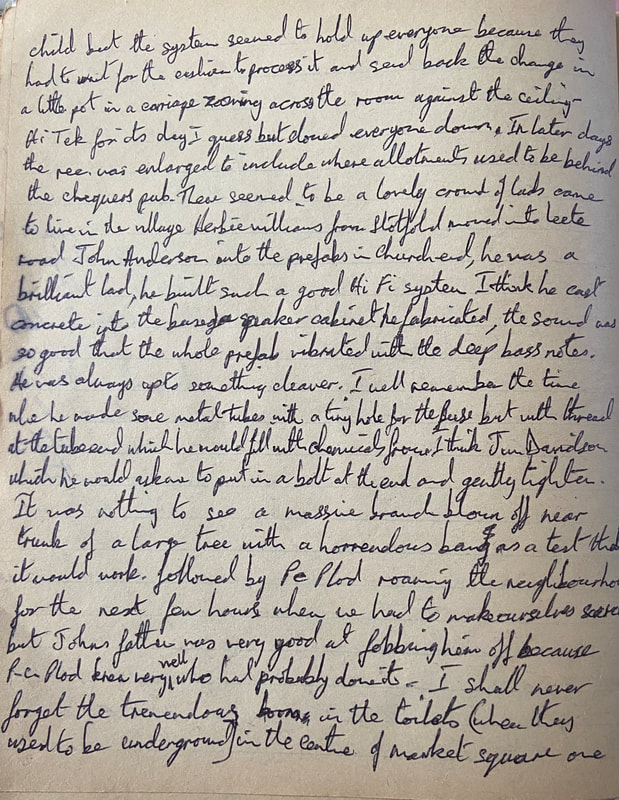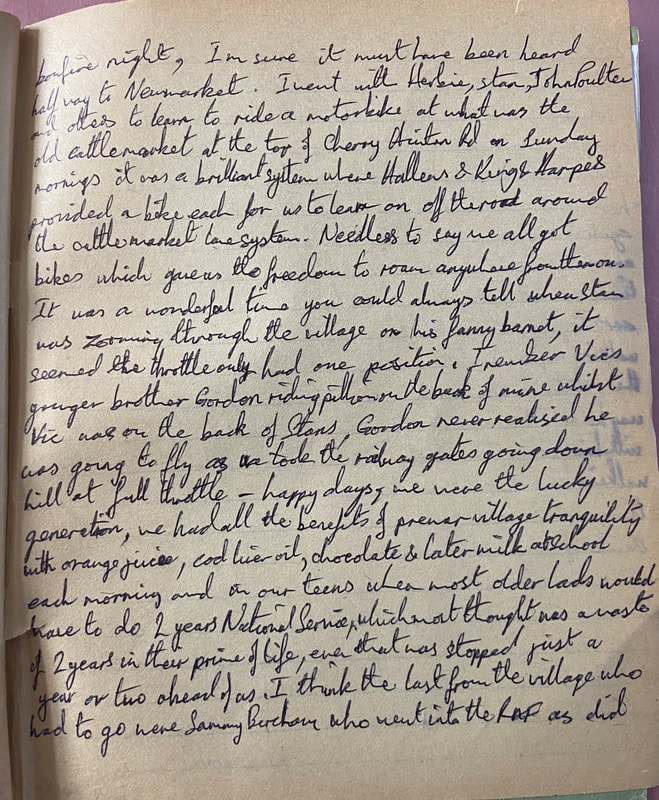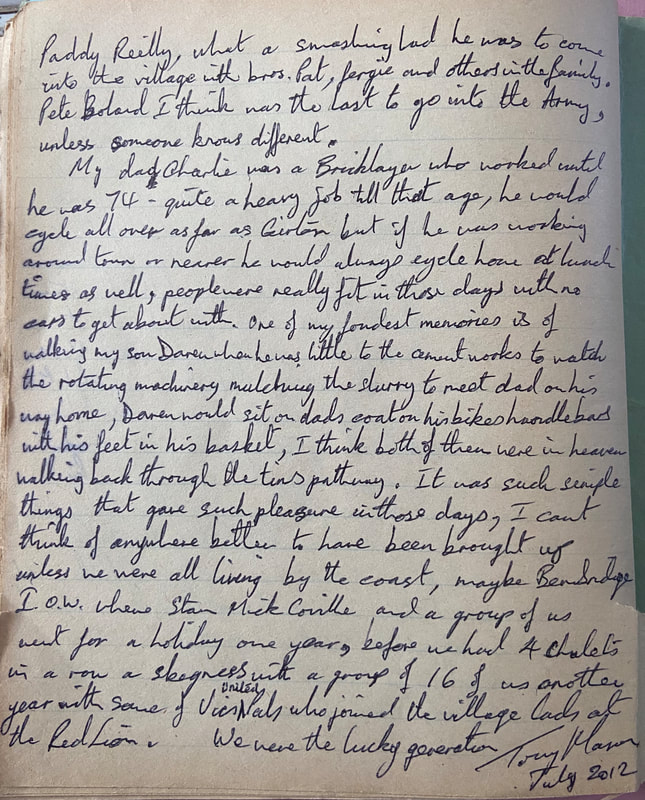|
Here you will find the complete article by Chris Gifford 'Cherry Hinton 1946 Onwards' - if you haven't done so already, I would encourage you to take a brief look at the introduction page about the memory books and this accompanying article first - which you can do by clicking the link here: Cherry Hinton Memory Books - Introduction
There are three books altogether and this one separately written article - you can find the links to the other books and this article by visiting the Cherry Hinton Memory Books Introduction page, mentioned above, or by searching the index (Categories) on the righthand side of this page or by using the search box on the right.
Cherry Hinton 1946 Onwards Chris Gifford 5.6.12
Chris Gifford Cherry Hinton Memories
“Are you sitting comfortably? Then I’ll begin!” This we heard as infants in the school hall. A short story on the wireless in early afternoon, and afterwards, we had to lay on rush mats to try and sleep. I remember that we had “Music” once a week. A low cupboard running down along one side wall, stored all of the instruments. We boys wanted to get hold of a drum. But as I sat near the opposite wall, all I ever had was the triangle – such a disappointment. So begineth the course for my life. After one Christmas Party in the Hall, we came out to find that it had snowed. We began to make slides, but I had crepe soled sandals which would not slip. So, I made sure that I had leather soled shoes on the following day. Near the entrance to the Playing Field was a small brick kiln, which seemed to be smouldering for days and blackened Pots etc eventually came out. The Sports Days were exciting. We all had roped off areas for each class along the far side of the Playing Field. At one Sports Day, Susan Thompson and her friend were short of a third person. A teacher asked me to join in. The girls were a couple of years older than me, but they were ‘girls’, and I was confident that I would keep up with them. After about 20yards I realised that I couldn’t, and half-way along, they pulled me off my feet. So that I went head-long onto a white line. I returned to my class, looking, and feeling, a right Charlie. I think that we all enjoyed “Tig-Ball”, when one was hit with a tennis ball, one joined the “catchers”, until there was only one person left. Football was our passion. Putting a sleeveless jumper under one’s football shirt to keep warm. Having your mother’s women magazines down your socks as shinpads. Having football boots on already, before one caught the 131 Bus into town. The terrific racket stamping up the stairs to the top deck. Dangerous leather studs with protruding nails. Cutting three or four parallel cuts down one’s leg. Or in my case cutting mums mags to shreds. I have always enjoyed dancing. Ballroom, Barn dancing, German dancing, I liked it all. And I put that down to the lady who used to come and teach us Country Dancing every week. I used to like dancing with a pretty girl with lovely red hair, freckles, and plaits down to her waist. I used to hold the door, as everybody came into the classroom. Quickly whisper to her, “Can I be your partner?” She always said “Yes”. You see that I never had trouble with girls under 12, and over 70. It was the bit in-between that caused me trouble! At our recent Cherry Hinton Reunion at a Fulbourn Pub. I kept saying to ladies, “I’m looking for my Country Dancing partner. Was it you?”. Plenty of giggles, until I asked a rather younger young lady. A look of contempt came over her, and she said, “You had better ask my older sisters!” Boom! Boom! It was clever of our Headmaster to play some classical music at morning Assembly. I liked “The Hall of Mountain King” best. He used to ask us questions. One was, “What is a weed?” And of course, we all gave various plants as the answer. But he said, “Anything in the wrong place. So, a potato could be a weed, or if one dropped a couple of lettuce seeds in the wrong place – they would be weeds.” I have remembered that answer for over sixty years, but the question has never turned up! So, if we have another C. Hinton Reunion, will somebody please ask me the question. Stop me dreaming about that answer! I remember that the teacher asked us to bring a potato to school, as we were going to cut them in half, and make potato prints. Modern ideas even in those days. The following day, I walked to school with another boy, and as we reached the Tin Hut, we remembered – no potatoes. I used to help my dad with planting potatoes, so I knew that they wouldn’t be too deep. Somebody had a vegetable patch between the railway line path and the playground boundary. I told my friend to keep an eye out. Took a stick, ran over to the potatoes, and quickly dug two out. Of course, all afternoon, I was waiting for the headmaster to come into our class, but nothing happened. Another time, the headmaster asked me to take a bundle of old letters to the Vicarage. The stamp on the top of the letters was Queen Victoria. Many of us collected stamps in those days. I kept looking at that stamp, and I gave into temptation, and ripped the corner off that envelope. (Even in later life, I was prone to give in to temptation – not stealing, unless it was a cherry). Then I thought, I’m going to get “told off” for taking one stamp, I might as well have more. I worried about it at the time, but nothing happened. I remember a Vicarage Fete, and they had a painting competition at 6 pence per entry. I did a vase of flowers. A blue vase with some red crosses on it. John and Peter Hedge and their mother were going to the fete. I tagged on with them. The winning entries were pinned up on display boards. There was my painting, but with a girl’s name on it. I told Mrs Hedge, and she went over to tell them the mistake. When the prizes were given out, I was given two fairy cakes worth 6 pence. Disappointed Tunbridge Wells! I never went in for anymore painting competitions. “Turf” cigarettes had printed cards onto the packaging. So, as we walked to and from school, little Eagle Eyes were on the lookout for old ‘Turf’ packets. Brian and Tony Tabor, as they lived at the Chequers Pub, suddenly cornered the market. They came to school with packets full of Turf cigarette cards. The dear boys had emptied out all of the Turf cigarettes and taken the packets. After which, customers were given their cigarettes in small paper bags. Then dad had some pigs down the end of the garden and took some farming magazines. So, when our teacher asked us to look out for pictures of farmyard animals. Tony arrived for school with a whole pile of magazines and gave them out. But there were only a few pairs of scissors, and I became tired of waiting, so ripped out the various pictures. Pasted them in my book, job done. But the teacher was not impressed. This was while in the Tin Hut. The teachers had a chart on the wall to record Tables. One had to say the table and then answer some questions, i.e. what is 7 x 3? 9 x 3? Etc etc. Success meant a star against your name. I struggled to get 2 stars, while some children had 5 or 6 stars. I had forgotten that we had poetry and we had to write out the poems into our books. The neatest one got a prize. We boys discussed the prize as we walked home and decided that it must be a penknife! I won the prize, and it was a book of children’s poetry by R.L. Stephenson! Deep depression as we walked home. A poetry book of all things. Some weeks later in Assembly, the Headmaster asked a question to which the answer was R.L. Stephenson. Nobody knew the answer. He said, “I’m surprised that Chris Gifford didn’t know the answer, after winning that book of poetry by R.L. Stephenson”. Of course, I went as red as a beetroot, having not even opened the book. Last year at the Trumpington car boot, I brought a copy, thinking that I would actually read it after 60 years. But I mislaid it somewhere in my house. Sorry! Mr Stevenson. We were writing with the simple nib pens and had to keep dipping the pens into the ink. When we came out of school one afternoon, a man was sitting outside the Tin Hut with a board of colourful fountain pens. They had wooden bodies. He said that if we brought him a bag of old clothes, we could get a pen. I ran home and got a bag of clothes. My mother being in Town. But he said that these weren’t enough, so I had to run home again, grab my dad’s old pullover and an old jacket, run back again. This time I was given a pen. The next morning in class a lot of us were writing with our bright, new pens. Tony Tabor and I were good friends. By the time we were in the top class, bikes were beginning to become available. I was scared to sit on the saddle at first, so sat on the back mud guard. Spent hours going up and down the lane beside our old house, which led to the Stevens wood-yard and black barn. I was always after wood off-cuts and saw-dust. I took my bike to the Rec. Whilst there, I tried to sit on the seat, as the grass gave a softer landing, if I fell off. Once in the saddle proper I could ride to school. Tony was also riding to school. One day we were racing each other home. Neck and neck, we peddled furiously. Suddenly we caught up with an old man going slowly. I was on the inside and I realised that if I braked to go around the outside of the old man, I would lose the race. I saw that there was just enough space for me to over-take on the inside as Tony on the out-side. We flashed past, and we could hear the shouting and swearing fading into the distance, as we arrived home. A draw! There were a whole bunch of children who lived in Mill End Close, opposite to the Recreation Ground (Rec). We met on the Rec and soon had a game of football in progress. Anybody who turned up – played. 15 a side, 20 a side, it didn’t matter. All that mattered was that the kid who owned the football turned up. Otherwise, we picked sides to play hide and seek (offs). Initially, there was only a swing on the Rec. If one was on the swing, and a Tiger Moth flew up from Marshalls, it made a strange noise with one’s ears. Near the swings stood a circular stand of plum bushes, but with a hollow space in the middle. Somebody suggested going around the circle without touching the ground. Some promenade tree roots in some gaps helped this along. Next suggestion was tig, without touching the ground. Exciting stuff, but usually somebody went home with a dirty handkerchief tied around a leg wound. There were bushes up the sides of the Rec and a line of mature trees across the end. More testing to our climbing skills. One day, Tony Tabor and I rode to the end of the Rec and decided to cut a track through the big trees. So, we spent a happy time with a spade and saw making our dirt track. Making a half circle with short branches on the Rec itself. We began the races beside the big trees, around the half-circle, and then to the trees. Any over-taking had to be done on the half-circle. We used to let other kids use our bikes to race. Plenty of fun, until it was another race between Tony and myself. Just before we went into the trees, Tony’s pedal went into my front wheel, and whipped out several spokes in a split second. My poor father used to spend a long day repairing cars at a garage along Cherry Hinton Road (Cambridgeshire Motors), cycle home, and find more work with our bicycles. We made bows and arrows. Took then onto the Rec to see who could shoot the furthest. One boy had a large box kite, which went absolutely miles into the air. We spent many happy hours trying to make kites out of old newspapers, bamboo strips, glue, paint and string. We had to run at 50 miles an hour just to get those kites up in the air a bit. Catapults were another obsession. As we wondered about, we always kept a good eye out for suitable wooden forks in a “Y’ shape. I found a red car wheel innertube in my dad’s garage. “Borrowed” my mum’s scissors and cut off strips for catapults. I think that nearly every kid in the area, turned up for a pair of red rubber strips. At the end of the Rec was usually a corn field, and we enjoyed making tracks and hiding places in it. Until the farmer sent the local Copper to tell us off. I remember lovely summer evenings when we were all having great fun and our mother coming to the Rec to call us Gifford three in for bed. Looking at the older kids, who were allowed to stay out. There are photos of my father as part of the Chequers Darts Team, in cricket whites in the Cherry Hinton Team, and he was in the Football Team. After he married, he didn’t have the time for any of it – which is sad. Our place of joy was the Spinney. A wild place of small hills and a deep hollow, thick with bushes and some mature trees. To have such a place at one end of the village, opposite the “Robin Hood” pub was brilliant. We used to gather on the Rec. Divide into two teams. One side would dash up to the Spinney to hide, while the other side counted up to 500 (nothing wrong with our village education!). Whoever was caught had to join the Seekers, until only one or two were left. Not being able to find them, sometimes we called out “We are going home!” and all troop out of the entrance. But then creep around the edges, waiting for movement. Then all poured in to give chase. My middle brother Dave (Todd) was extremely cunning at hiding. Once he sat in the middle of a creeper covered bush right beside a footpath. Another time, he climbed a tree and lay on an Ivy-covered branch, going over a footpath. So, we all passed by, underneath him. I once sat under a bush, only to be entertained by a little mouse fussing about. In summer, we used to ride our bikes down the hollow. In winter, we went down on our home-made sledges. There was a tall plant, which when old and dried out, made beautiful spears. The hard root had a long sharp point. We used to stand on a hill. Put the index finger on the end and hold the spear between the thumb and middle finger. Lift the spear up with the other hand, and throw. So, we all lined up on a hill. One, two, three, throw, and a whole shower of spears flew off. Most of us had wellies on. Once when I bent forward to collect my spear, another spear hit my wellie. It went through the top of my wellie, grazed my calf, and made a hole in the opposite side. Everybody was very impressed by the effectiveness of the spears. It was not until many years later, that I realised that the little rascal John Hedge, had deliberately thrown his spear at me! If there were only two of us and we had catapults, we would hide behind two thick tree trunks, about 60-70 yards apart. Then fire lumps of chalk at each other. Chalk was slow in flight and easy to see. So, we didn’t get hit. But if one of us found a marble in our pockets, we called out a warning because one couldn’t see a marble in flight, and it was very accurate. We hid behind the tree trunk, as the marble thudded into it. If any of us had any money, we bought a bottle of pop, and a batch of bread rolls from the bakers, near the Robin Hood. Then go into the Spinney to divide them out. Opposite the Unicorn Pub in C.H. High Street, was a footpath between the houses. It led into the end of the Bakeries very long garden. We chose to walk up this path, because it went past various fruit trees. Especially a heavily loaded Victoria Plumb tree, right beside the path. So, on our way back with our loafs of bread, we would pinch several plumbs. (Still my favourite). But the baker used to wait outside the Robin Hood, for our father to cycle home, we got warned to leave the fruit alone. The smell of that Bakery was gorgeous. Those rolls had a special taste, not like the bland white bread of today. Being the eldest son, our father used to put me on his bike, and cycle to the top of Cherry Hinton Road, to the Cattle Market. He used to buy cheese roll, which had thick slabs of cheddar. Several years ago, I went to the Bury St. Edmunds Cattle Market, and brought some cheese rolls and it was the same taste. I was delighted. Opposite the Robin Hood was the spring, and one could see the water bubbling up, a pile of fine grit moving about. There was an island with mature trees. We put down branches to make a bridge. We got onto the island but several of us had wet feet. The water became deeper, and it was covered in thick weed. But there was a clear patch, and a large Pike could often be seen sun-bathing. One day a group of bigger boys from the Church End of the village, arrived with home-made spears to get the Pike. They were all standing in the water, which had gone muddy, shouting at each other and stabbing the water. It’s a wonder none of them were injured. They all cycled off, but I think, without the Pike, which must have swam downstream to find a new home. At the other end of the spring was a high black metal fence. But we could get our feet between the uprights and walk over to the other side. There was a large meadow, and the stream went on to Cherry Hinton Hall. At the time the Hall was in private hands. The back of the Hall was an overgrown jungle. So, we could follow the stream along and into this brilliant place. If we made too much noise, there was always the possibility of being chased by one of the gardeners. I remember one sunny day, and we were following a track through the jungle. I climbed onto a thick fallen tree trunk and was just about to jump down, when in a patch of sunlight lay two grass snakes. I yelled “Snakes”, and we all ran off in panic. Us little boys had never seen snakes before and were easily scared. There was another set of black metal fencing at the other side of the C. H. Hall, which we could easily climb around and come out at the Brook and allotments. So, we could return home along Mill End Lane. We spent hours and hours down at the Brook, catching sticklebacks. Most of them were 3 spine but occasionally we caught a black 10 spine fish. Usually, it was my brother Dave who caught the 10 spine fish, as he went down the stream of the Wooden Bridge, and just used his hands to catch fish. Further down-stream, where it was too deep to paddle, we had some thread and a cane, tied on a small nut for a weight and a small worm. The bigger sticklebacks would take in the end of the worm, and we would gently pull them out. Sometimes they dropped off but in the Brook. We lived in the “Red House”, which was a pair of old red brick semi’s, belonging to the Church. We were on the High Street, opposite the Chequers, and the Thatched Cottage. It was only a one room up and one down. Very dark inside, and dark twisting stairs. We had gas lights and had to go “over the yard” to an old wooden hut privy. Dad had a large shed next door, where he had a vice, tools, and car parts, as he was a mechanic by trade. By watching him in his shed, we learnt about the various tools and how to use them. We used to make our own trolleys, fishing rods, and sledges etc. Although we left his tools all over the place, I think dad was quite proud of our efforts. One day, Billy Taylor and I were looking around in dads shed. Billy picked up a strange box with a plunger on top. Pressed the plunger and it made a horrible noise. It was a horn from an old 1920’s Taxi. Beside the Thatched Cottage, on the other side of the road, was a large meadow going down to Fishers Lane. The farmer kept a mixture of white bull, cows, and a couple of horses, all in together. We sat on top of the wooden rails and took it in turn to press the plunger. Weerrker! Weerrker! Weerrker! The animals began to run I a group around the meadow. Weerrker! Weerrker! Weerrker! More and more noise. Faster and faster went the animals, until it was like a wild west stampede. They were thundering around. While at the Fishers Lane end, the white bull disappeared right through the hedge. We ran into the middle of the road and looking anxiously to see what would happen. Suddenly, the white bull appeared, coming straight down the middle of the road towards us. We immediately ran for my dad’s shed, and looked out from the doorway, as the bull went past. We stood in the middle of the road again and watched the bull going up towards the Robin Hood. Sometime later, back came the bull with a man on a bike guiding him home. Back in the shed again. A lot of excitement and we got away with it completely. The next house along was a big house made out of chalk/clunch, most probably from the Spinney. There was a long barn at right angles to the house, and a tall pole, which could have been a wireless Ham Radio. Every evening a little owl sat on top of that pole and screeched. Beside the chalk house was a footpath going to Mill End Lane, and so was our short-cut to the Brook. One side of the footpath were trees and bushes, and on the otherside a large meadow with a tall pear tree and a carthorse. The pears were small, red/yellow and sweet. The ripe ones dropped onto the grass, and we would go over the fence, run out to the tree, picking up as many as we could, stuffing them down our shirts. But the carthorse didn’t like us in his meadow, and always chased us out. So, some of us lads went to the Mill End Lane end of the meadow, The horse gave chase, as we others went in for the pears. As soon as he saw us at the tree, he came charging up. But we already had our fruit. For us boys, the best place in the world was Woolworths. They sold what we wanted. Foreign stamps, balsa wood gliders, marbles, and fishing kit. Brilliant. Brian and Johnny Richardson lived on Coldhams Lane, and they had the Cement Works pit beside them. A real source of adventure. Their father took them on bikes right to the end of Coldhams Lane, over Newmarket Road, past the Gas Works and to the River Cam. So instead of sticklebacks, they were catching Gudgeon, Roach, and Perch. Huge monsters in comparison. They told us lads at school and got us all excited. Woolworths sold a beginner’s kit of line, float, weight and hook on a card. Dad got a piece of 1” square board, knocked in some staples, and nailed on a cotton reel, so I could wind on the line, and fix the hook to the staple. Dad found an empty paint tin, and a piece of white bread. Ready. From the Chequers, I cycled up to Coldhams Lane and met Brian and Johnny. That first time seemed a long cycle ride. Too much anticipation I suppose. Soon we were beside the river, and I watched what they were doing. Put my float up to fish close to the bottom. Gudgen shoal on the bottom and bite freely. So, it’s only a couple of minutes before one of us has a bite and swings in a sturdy fish. We only had to fish 3” or 4” from the bank, so it was easy fishing. Time goes by quickly when you are having fun. We gradually moved upstream until we came to the Jesus Green Weir, and that became our favourite place. Fishing became one of our main hobbies. We three Gifford brothers always took our rods in the car, whenever dad took us out. Even coming back from a Hunstanton seaside trip, the rods were with us. Halfway back home he always stopped at an isolated pub right beside the river (A10). We caught some lovely silver bream, another new species for us. Dad always came along with glasses of pop and crisps. We didn’t mind how long our parents were chatting in the pub, and it was always disappointing to have to stop fishing. Brian Richardson became a very accomplished fisherman. After about 50 years I was able to obtain his phone number and we are going to meet up and have a go at fishing again. And of course, it will give us a chance to chat about our childhoods. There was no T.V. when we were young. The Victoria Cinema on the Market Square used to run Sat morning films for us children. The “minors” had a membership card, and sometimes checked the cards at our back of the cinema entrance, beside the Holy Trinity Church. The Mark’s & Spencer shop is now on the site. My friend Billy Taylor had forgotten his card at that morning’s check-up. I went through, and then sneaked my card to Billy behind the back of the checkers. They made us sing songs first of all. The words were put up on screen, and a white ball bounced along the words. Quite boring, unless it was the Woody Woodpecker song, and we could make a lot of noise. The films begum with cartoons, then a serial of a cowboy, detective, or later a space film. One could see the cotton holding up the spaceship and smoke just puffed out of rockets. The serial always ended at a critical point. Was the hero going to survive a tomahawk blow, or a gun shot? How was he going to get out of this tricky situation? Then we had a full-length film, and we loved Tarzan of the Apes, or Cowboys & Indians. After the cinema, we looked around the Markey Square. Our dad used to mend the car of a market trader who used to sell broken biscuits. We used to say hello to him, and he would say “Hello, the Gifford Boys”, and give us a bag of mixed biscuit pieces. Then to Woolworths to spend our 6 pence pocket money. Before catching the 131 Bus back to Cherry Hinton. A group of bigger boys were discussing the Treasure Island film about Pirates etc. I ran home and asked my mother whether I could go with them, and she said yes, which surprised me. It was a very exciting film. Especially when the boy had climbed into the near empty apple barrel and he over-heard Long John Silver’s plan. A Pirate was just about to stab into the barrel for an apple, when land was sighted. Again, when a pirate had chased the boy up to the Crow’s nest, and the boy had to shoot him. Recently, I have been able to obtain a copy of that film and enjoyed watching it once again. On the corner of Mill End Close and the High Street was a Grocers shop. In those days, nothing was packed. So the staff had to cut, pour and pack every item. Consequently, there were very long queues in the shop. I was only about four years old, and my mother used to give me a list and money. The shop was always crowded to the door. All I could see were legs. I used to worm my way to the counter and could just hold up the list above it. Which attracted attention and I was soon served. I remember one woman saying loudly “why is he the last in but the first to get served?” I think that we lived in a golden age for childhood, and we all had a very happy and exciting time.
If you'd like to support the work that I do and the archive, why not buy me a virtual coffee, I'd be really grateful and it will help keep me going!
Just click on the green button below :)
1 Comment
Here you will find the complete contents of Cherry Hinton Memories Book One - if you haven't done so already, I would encourage you to take a brief look at the introduction page about these books first - which you can do by clicking the link here: Cherry Hinton Memory Books - Introduction
There are three books altogether and one separately written story - you can find the links to the other books and story by visiting the Cherry Hinton Memory Books Introduction page, mentioned above, or by searching the index (Categories) on the righthand side of this page or by using the search box on the right.
BOOK ONE
Book One “The Cherry Hinton Gang” Those Golden Years
Contains memories from: Mick Covill Bill Chapman Kay Smith Diana Lilley Ann Gentle Chris Kirch Gill Rapley Sue Gentle Ronnie Clark Tony Mason
Below you will find the full transcription of book one, copied as it is, with pictures of the handwritten stories to compare (and send me any corrections!). You can choose to read through it here or, for more detail, you can click on one of the names above to see their story individually and any extra pictures that I have added to illustrate their story.
Book 1 “The Cherry Hinton Gangs” Those Golden Years.
Mick Covill 4th Jan 2011
‘Yess’ .. I do hold Cherry-Hinton with a great love & fondest memories. I myself was not born in Cherry Hinton but was born and lived in Broad Street of East Road Cambridge, born in 14-Aug-39. Can only just remember the last part of the war air raid shelters and the Anderson shelter we had in the living room which we got under when the air raid sirens went off. My mum & dad moved to Cambridge when he got a job with Ralph Thompson as a painter. We then were offered a council house in either Trumpington or Cherry-Hinton but as the house in Fernlea Close were built by R. Thompson and the yard and offices were in Fernlea Close my mum & dad chose Cherry Hinton. We moved to Cherry Hinton when I was about 9 years old into number 6, the beginning of my life in Cherry Hinton. I always remember Bert Quinney’s shop just in the High Street. You used to go in like a dark cellar where they sold most things. They then had a house & shop front built at the front of Fernlea Close, where we used to do most of our shopping. Bert Quinney used to be the local Bookies runner, and my dad used to give me some money wrapped up tightly in paper & say take this up to Bert’s. Bert who used to call me Billy - don’t know why – used to slip the money under the counter. If dad won any money he would send me up to Bert’s & I would say “have you anything for dad”. Bert would say “I will have a look” and then produce another bit of paper wrapped around money and say “here you are Billy” and slyly pass it to me to take back home. Bert Quinney’s shop was always open from early morn to late at night, he was a good man, friendly and kind. One of my early introductions to Cherry Hinton was when Kenny Sutcliffe, who I did not really know, wanted to have a fight with me and my brother John. If I remember we declined and ran home. My sister Marie and I went to the Catholic School in Cambridge, so we knew Ron Clarke and his family, also the noble family and the boys Peter George and Paul who lived on the High Street. Their father George was the bone collector from all the butchers. I suppose my introduction to the friendship that Cherry Hinton was to offer me was passing my 11 plus exam and going to the Central Grammar School. Here I met and was in classes with John Anderson, who lived in the prefabs in Church End, and Ray Williams or chick to most people who lived in Queens Meadows. Also, Tony Short who lived also in Fernlea Close. I used to do a paper round which was run by Jim Chapman, Bill Chapman’s uncle, I did Pen Close, Shepherds Close, Fishers Lane and worst of all, Fulbourn Old Drift. The drift was not very nice as it was very dark and everybody had guard dogs, which were not that friendly. Jim Chapman ran the paper business from the back room in the Chequers Pub run by Tony Tabor’s mum and Jesse his dad. The years slowly passed and there are memories of all the new families moving into Cherry Hinton i.e. the Medow’s family, the O’Reiley’s - Paddy, Patric, Phillip, Brendon, Fergie – very poor families. I used to go scrumping walnuts with Paddy in Chalk’s farm off the High Street and finished up with stained hands which lasted weeks. There was Jimmy Davidson, Mick Williams, who I think went to the County School also moved in. When recalling names there was a great friends Peter Boland & Mick Boland, who lived down Mill End Road with sisters Margaret & Liz, also Stan Paine who lived in Rosemary Lane. While I drift from name to name let’s not forget the Youth Club which was held in the old Cherry Hinton Infant School by the Labour Party members an old record player playing the latest hit songs and then the skifle groups who and about, and then the Youth Club held at the Lower Netherhall School and also the dances held in the British Legion Hall, Fishers Lane, where all the latest budding groups played. At these events all us Cherry Hinton boys and girls danced the night away and if I remember correctly no alcohol. Flashes come back to me now of the Queen Edith’s school dances where the lads would sit in one corner of the room reading in Cambridge Blue, a paper with all local football results and pictures. Must not forget my friend J Poulter who I met at Central School and I introduced him to the Cherry Hinton way of life and am sure he then made many, many friends. Down the Red Lion pub, run by Norman and Joan, we played darts and bar billiards and on a Sunday morning we all played football which could last up to 2-3 hours and then we would go to the Red Lion for a drink. Norman would have loads of orange drinks lined up for us all which quenched our thirst. Must not forget Cherry Hinton great such as Brian Stevens, Peter Dean, John Bertram, Danny Buttress, Mick Scoett?, Matt Lindsay. I think ... could go on and on and write page after page. The pages I wrote may not have been of historic or exciting events but a small glimpse of some of the people I met from school to growing up and can say Cherry Hinton is in my blood. I love it, maybe I love the past more than the present because it has changed so much. However, I thank all those people and friends who made my life in Cherry Hinton such a wonderful life. Yours Mick Covill
Bill Chapman’s Story Written 26/04/2011
I was born in Fisher’s Lane and then moved to Fulbourn Road when I was two months old. I went to school with my sister Shirley. We used to walk along a path which was called Long Walker (which started at Fulbourn Road and ran along the back of Cherry Hinton Rec where Colville Estate is now. How the High Street has changed! There used to be a cottage on the corner, opposite the Robin Hood (just outside the Spinney). An old man, Mr Clark lived there. In the Spinney, gypsies would often park and live there sometimes. At the junction of the Robin Hood there were no traffic lights as today, but a little slip road from Queen Edith’s Way to Cherry Hinton Road and then the other road went straight across to Cherry Hinton. There was a little triangle green in between where Mr Snowy Scott used to preach on a Sunday evening. Mr Scott used to grow his own tobacco. On the left hand side there was a big hole (where a bungalow is now), we used to sledge there (it was called Prior’s Field). Sheep were herded by the Creek Brothers from the Chalk Farm (off the High Street) to fields at the back of Fulbourn Road (near the water softener where the water company is now.) Next to the water softener there was a big barn where all of the wheat sheaves were gathered and stacked and threshed with a threshing machine. There used to be loads of rats and mice around there. There also used to be hare hunts that came through the village with all the hounds and then chase the hares at the back of Fulbourn Road. Taffy Lloyd (from Queens Meadows) was the local poacher. He would put snares out in Lime Kiln Quarry and you would see him coming home on his bike with rabbits across the cross bar. Percy Tabor was the nightwatchman at the chalk pits (where the caravan site is now). Luffy Tabor used to drive the steamroller through the village, and he was a great friend of my dad. Rarzo Tabor was the landlord of the Robin Hood. Dad, Luffy, Rocky Root and Tubby Anderson used to sing around the piano at Christmas at 56 Fulbourn Road (where we lived). There were two bakers: one in Fulbourn Road called Don Smith’s – the other one was in the High Street – Root’s Bakers. Then there was George Parish the butcher. Across the road there were two cottages next to the shop. There was another butchers opposite the rec (where the Building Society is now). Next to the Rec was Sid Hancock’s (the cobbler) shoe shop. Then the Chequer’s Pub run by the Tabors. Across the road from the Rec was Steven’s Building Yard where we used to keep the football marking machine. My dad (Olly) used to mark the football pitch. My dad was well known in Cherryhinton because he helped run the football club. My mum and dad were good parents. Next to Love Lane (where the bank is now) there used to be a smallholding with chickens and ducks in a field. Next to that was Chalks Farm (roughly where Desmond Avenue is now). There was a big drive where they took cows across the High Street to the field opposite. There was a big pond in the field opposite (roughly where Colville Road is now). Further on opposite Fisher’s Lane there used to stand a big tank filled with water. On the corner of Fisher’s Lane, I used to go to Chapel with my sister Shirley. We would be dressed in our Sunday best. Next to the Chapel (towards the railway line) were a row of 4 cottages (only 2 now) and then a police house. This was occupied by Mr Laddington who was the village copper at the time. Mr Bartram was the crossing man who was in charge of opening the railway gates (he was the father of my friend John). Just over the railway was the green hut where we went to youth club and played table tennis. Neville Cullup was a very good table tennis player. The school next door in an old building which has now been pulled down. Tommy Bray was the headmaster and he lived in a house next door (next to the Green Hut). Just across the road was the Five Bells pub and Quinney’s store where I used to buy my sweets. B.C.
Memories of Cherry Hinton from Kay Smith
I lived in Mill End Close until I was 17 years old. I think we were all very lucky to have lived in such a small safe community. In Mill End Close most of our parents were married just before the war and as was usual most of our mother’s either didn’t work or had part time jobs – unlike today. My parents bought the house when they married in 1939 and my mother’s 1st cousin bought the other half of the semi so I was fortunate as an only child to have 4 cousins next door, namely Cynthia, Charlie, Diana and David Lilley. Diana being 3 weeks younger than me, Chris and Lorna Ketch, Ann and Sue Gentle, John and Christine Cornell and John and Peter Hedge, all similar in age lived in this great little cul-de-sac. We all went to the village school together, walking safely through the village without parents coming with us. We had Miss Wilson in reception class – with orange juice, cod liver oil and malt. Plus, the small bottles of milk, which in winter we stood beside the large ‘turtle’ heaters to defrost the ice. We had Miss Rush in the second class and I remember her saying as we left the class that we had to leave the bead frames behind but take our fingers with us. I think it was on Friday mornings in assembly that we heard a record played but I only remember the Flight of the Bumble Bee and Finigal’s Cave. Perhaps they only had 2 records. I also remember Jeffrey Rheimen singing Greensleeves – he must have been good or brave! We had some sad momentous occasions when Mr Bray died and also when we were in Miss Dunnetts class someone came into class and whispered in her ear and she announced, “The King is Dead”. There was a great celebration on the Rec for the coronation and everyone dressed up in fancy dress. I was a black cat. I also remember watching the hunt leaving from Chalk’s Farm – an amazing sight. We used to go to Ling’s sweet shop opposite the school, and buy packets of crisps from Smith’s shop with the salt in the blue paper and hot bread from Root’s – all in the High Street. Our favourite play areas were the Spinney, catching sticklebacks in the brook – and falling in. I went to church on Sunday mornings and then to the Baptist Chapel for Sunday School afternoons. The vicar was Fatten Forrest who drove an amazing car and used to bring carrots to school for us to eat in a wheelbarrow. He always seemed very shy but was very kind to me. When I went to see him about getting married in the church but no longer lived in the parish he suggested I use a different address – so my marriage certificate gives Ann Gentle’s address and the Gentle’s very kindly let me get ready and leave the from their house.
Cherry Hinton Childhood – Diana Lilley
As Kay has said, I also lived in Mill End Close, my parents bought the house in 1938 and my mother lived there until she died in 1995. They were truly very happy days, the whole of the Close very good friends – always helping one another out – I remember in the summer all the mums and dads loading up old prams with games and equipment and food, and we would walk over Lime Kiln Hill to the Beach Woods – We would spend the whole day there playing rounders, cricket etc. using the trees as our posts. The parents would light fires and perhaps cook sausages etc. on to eat. We used to have a great time, and then again walk home. We were always very safe having games in a very wide area, and never any fears hanging over us. Kay also mentioned memories of Junior School, many of which I can remember. One thing Kay did not mention that I remember, was when we heard our 11 plus results, we individually went into see Mr Farmer, as it was then, and told our results. From school we were taken to Coldham’s Common swimming pool in our final year to learn to swim whatever the temperature in an unheated pool. Thereafter I would spend many days there at the cost of One Penny for the whole of the day. Playing in Cherry Hinton and spending a lot of time in the Spinney. I remember walking to the Robin Hood corner and seeing the patients from Fulbourn Hospital out for a walk. They were all tied together and were resting on the wall outside the Robin Hood Public House, before walking back. I found this very frightening. I could have been no more than 10 when Kay and I decided we would cycle to Balsham, which was a fair way. On arriving at my great aunts who had a farm, and I loved to visit – apart from the outside loo – (a shed with a wooden seat – with a hole in it). She said “Does your mother know where you are”, well as we said “No, why, should she, we are quite safe” – to which she fed and watered us and sent us home. I went to Cherry Hinton Church with my brothers and sister on a Sunday and continued on to confirmation classes in the vicarage with Mrs Forest. The vicarage was a very large rambling house – we used to sit in one of the rooms for our class – and the ceiling was peeling off on to us. It always caused quite a laugh. Needless to say I did get confirmed in 1956 at St Pauls Church on Hills Road, and I did get married in Cherry Hinton Church in 1964. When we were old enough, I delivered papers for Mr Seal – both morning and evenings, before and after school daily and on a Saturday I worked for Mr Bird the greengrocer in the new shops in the High Street when Colville Road was developed. As mentioned previously in this book, I also had to deliver to Fulbourn Old Drift – a very dark and not a very nice place to be in the dark mornings and evenings, likewise, the caravan site on Bennett’s Farm, Mill End Road. I often had to get my dad to come with me. Coronation year 1952, Kay’s family were the first in the Close to have a television and I remember each family having a time slot in which to go around and watch the occasion. They also had a motorbike and side-car which I remember being taken in when I was 11 to fetch my first pet dog Mick, and I also married a Mick! There are many things in this book already that I recall – the cycling through either the Tins or the Snakey Path to the secondary school and later on to work. Quinney’s shop open 7 days a week – when mums ran out of something on a Sunday – he would sell it to us – and then wrap it in newspaper to disguise what we had. It was illegal to sell certain items on a Sunday years ago. We were extremely lucky to have had our childhood in Cherry Hinton – we were well cared for and looked after. Very happy days. Several of us have flown the nest, but we still keep in touch regularly, for lunch and a chat – Kay Smith, Chris Ketch – Ann Gentle, Gill Fordham and myself. We are friends for life.
Cherry Hinton Memories Ann Gentle
I lived in Mill End Close with my parents and sister Sue – who is 3 years younger than me. We were a close-knit community only 22 houses in the Close, and all the children played together. I went to the village school and was in the same classes as Vic Phillips, they were happy days. I remember us giving Mr Reed? our class teacher the bumps on his birthday, he took it all in good sport, I remember going to Mr Ling’s shop and buying 1p OXO’s to eat as we could not buy sweets because of rationing. I still like them now. The summer holidays were great, we had the run of the village, going tiddler snatching in the brook, climbing trees on a ree?, many’s the time my dad would have to come and get me down as I got stuck up a tree. The Spinney was another favourite, my mum didn’t like me going up there but it did not stop me. My dad kept racing pigeons and Tony Tabour and many of the boys used to come and see them. Vic my dad went to Crystal Palace with your mum and doing the High Jump I think they went to the same school. 1927 was the years I think they would have been about 14 years old. The High Street was a lot different to what it is now, there were 2 farm cottages at the top of Mill End Close they belonged to Chalks Farm. The Jonson's lived in one of them. The farm was where the hunt used to go from, and we used to go and watch. In autumn we would scrump walnuts I have always liked them. opposite the farm there was a field with a pond. In the winter it would freeze over and we would skate on it. One day on the way to school I decided to have a go, the ice wasn't very thick and I fell in afraid to go home and tell my mum I sat in school all day in wet clothes. When I got home, someone had told mum she made me have a mustard bath to stop me catching cold. We used to go to parties in the Chequers pub they were great fun. I left Cherry Hinton in 1963 when I married J Holmes. We lived in Chesterton for many years and had two sons I now live in Landbeach. My son Kevin now lives in my home in Cherry Hinton having bought it when my mother died so the connexion still goes on as I come back home quite often. Ann Holmes
Some of my memories of Cherry Hinton – Chris Ketch
Our Cherry Hinton is unrecognisable from the one of today. There was only one pavement along part of the High Street, small gas street lamps and Chalk’s Farm on both sides. I remember a bull being in the field in summer and skating on the pond in winter. Twice a year the sheep were herded through the High Street, no traffic calming then, thank goodness. I too was a Mill End Close girl, living there for 20 years with my parents and younger sister Lorna. The Millers, Janet, Roger and Sally, lived 2 doors away, Jackie and Danny Buttreas? across the road and Les, Win and their son Richard “Bonzo” King next door. As the girls have said before, it was a safe, happy environment in which to grow up in. Everyone’s parents respected each other, the mothers calling each other Mrs, not using forenames and all extremely hard working. School was a good experience then. Mrs Runnett getting us to chant times tables in the tin hut, Mrs North playing her piano accordion and being flung around by the boys who hated dancing. We often played marbles after school, rolling them down the High Street on the way home. In the winter we made long slides on the ice and formed an orderly queue for a “go”. It was also where I met Gill Fordham, my very good friend who came to live on the “new estate”. She is an adopted Mill End Close girl now. The wonderful Bernard Reed was the best teacher ever. How he remembers us all I will never know. Sports days were a great occasion. The MC used to be Mr Thompson, Susan and Caroline’s father. Margaret Boland was a terrific runner, I did beat her once but only once. I remember Billy Taylor rolling one of the Richardson boys along in a huge tyre in one of the races. Gill and I came third in the three legged race on our last sports day. We won a comb each and we got a big cheer when we collected our prize and it felt like an Olympic medal. Summer holidays were long and the best ever. Groups of us would disappear all day in the Spinney, on the Rec or the Beech Woods. Sometimes we would club together to buy a hot loaf from Roots the bakers to eat on the Rec. If it was wet we would play Monopoly in Di Lilly’s dad’s shed, for hours on end. Church, Sunday School and Bible class was the plan for Sundays. We took a few pence for the collection but Lorna decided to pay a visit to Ling’s sweet shop sometimes and spent her collection money on sweets. Our mum found out when bubble gum stuck around her mouth. After Sunday morning service we would pick up an ice cream block from Quinney’s shop which he wrapped in newspaper. This was kept on the pantry floor as we had no fridges then. As teenagers we went to youth club in the school hall and the British Legion Hall in Fishers Lane where some good local bands played live. No alcohol or drugs then but we had a really great time without the need for either. Today, I live in Fulbourn where I see several old school friends. John Richardson works very hard in his woodyard at the bottom of my garden. Horace White is landlord of the Six Bells and lives near me. I also see Tony Mason around the village and Herbie and Marie Williams. All of them are still so friendly. Great memories of very happy days spent in Cherry Hinton. - Chris x
A New Life in Cherry Hinton – Gill Rapley nee’ Fordham
I came to Cherry Hinton with my parents Bill and Chris and my sister Margaret in 1952. We moved into one of the new council houses in Leete Road on the Colville Road estate. As newcomers we were not welcomed by all the villagers, some obviously thought this influx of strangers would change the life of this small community and not for the better! I well remember the terror of standing in the playground on my first day at the primary school next to the level crossing and knowing absolutely no-one. That school with its coal fires, outside toilets and overflow class in the Green Hut was, it turned out, a wonderful place of learning with headmaster Mr Farmer, teachers Bernard Read and Miss’s Rush and Dunnett who enabled many of us to pass the 11+ and move on confidently to High School and Grammar Schools. School holidays were spent in the Spinney, on the Rec, blackberrying on the Roman Road and exploring the Beechwoods. There were huge steam rollers in Pamplins Yard and Mr Fabbs equally huge pigs to feed in Fulbourn Old Drift. The Norman Cement Works along the Tins path was always fascinating with the huge cauldron of liquid cement constantly being fed by the chalk lorries from the pits in Lime Kiln Road. The Green Hut with Brownies, Guides, Cubs, Scout groups, youth club and table tennis club was our social centre. I learned to Jive there to Paul Anka, Everly Bros and Elvis and I also fell in love for the first time, all such bitter sweet memories. There were more pubs than shops when we first arrived but eventually Mr Seals newsagents, Mr Bowyers grocery shop and Mr Birds greengrocers augmented Bert Quinney’s and Lings sweet shop. The friends I made all those years ago thankfully remain my friends today – I see Chris, Kay, Di and Anne quite regularly and so many of “the boys” now spend their retirement on the allotments on the Black Land where Mary and I spend a great deal of our time. Cherry Hinton was a good place to move to in 1952 and it is still a good place to live in 2011 and I am thankful for it. – Gill
Sue Gentle March 2012 Mill End Close
My sister Ann (Gentle) brought this notebook of reminiscences to show me. Reading them made me want to contribute so here goes! I have lived in the Pennine Hills almost twice as long as I lived in Cherry Hinton but my memories of my happy childhood are vivid. As others have mentioned we were so lucky to have had the freedom to roam, climb trees, make dens, go on long cycle rides. We would run home at lunch time then rush out to play again. Or sometimes we would take picnics which meant we were away from home for hours. This did not cause any parental concern as it would have me with my children. As already mentioned by Kay, Mill End Close was a new build just before the war and most of the houses were bought by young newly married couples. Because of this a lot of children were born there, including us. As a consequence, we were never short of playmates. One of my first memories was of the close being flooded and having fun paddling in the road with our shoes on. The year before I started school Peter Hedge (who was one year older than me) broke his arm so was off school. He and I went up the Rec to play on the swings (yes, with a broken arm!) Whilst there a hunt passed by heading for what was then the fields beyond. We were so frightened by the noise the dogs made – we swang as high as we could to escape them. Now when I hear a lot of dogs barking I think of this. I remember walking to school with Christine Cornell and her pet chicken Billy. When we reached the level crossing we told Billy to go home, and it duly did. One day I took my little doll to school – she was my pride and joy. On leaving school some boys in my sisters year (was it you?!) took the doll off me and when it was returned it had one leg missing. I cried all the way home. The leg went missing by the level crossing. Because I was so upset my dad went to look for it in the dark with Mr Bartrum the crossing keeper. He had a paraffin lamp. The leg wasn’t found but the next morning my doll had a wooden leg carved by my dear dad. It was even more special to me after that. We loved to climb trees at the top of the Rec. How pleased I was with myself when I managed to get from tree one to tree seven without touching the ground. My sister got stuck up one of these trees and had to stay there until our dad came home to rescue her. I thought her a bit of a sissy! We learnt to do things on our own like riding a bike and swimming. The former by getting on by a bench seat on the Rec and by falling off when wanting to stop. The latter by spending much time at Coldhams Lane swimming baths which I remember as always being cold. It didn’t bother us though. I loved school especially Mr Read’s class. His classroom was of a wooden construction that was separate from the rest of the school, it was near the railway line. One day, when I should have been paying attention, I counted the number of freight coaches there were passing by. I hadn’t realised Mr Read had stopped talking and was looking at me. When he asked me how many coaches there were (I still remember there were 23) I had to write out 23 times “the goods train engine was pulling 23 coaches”! We had a great time in Mr Read’s class doing project work. One project I was involved in was a study of the flora and fauna in the Brook. This was an excuse to have fun! He would allow us to go to the Brook in project time and we would come back invariably late and wet having paddled too deep or fallen in. Imagine a teacher giving pupils that freedom now! How fortunate we were. Our parents had modest lifestyles but they gave us a very rich and secure upbringing in Cherry Hinton – Sue (Gentle) March 2012
Ronnie Clark 12-6-09
I remember in the 1950’s when Cherry Hinton had the best village football team in Cambridgeshire, and around the 1950’s when Cherry Hinton was a village, sadly no more. Farms up the High Street, Smiths bakers in Fulbourn Road. A piano playing all the old songs on a Saturday night in the Robin Hood. I remember the sheep being brought from Fulbourn Road down the High Street to Chalks Farm. Old Ken Baker riding side-saddle on the big Shire horse, chewing a bit of straw, delivering muck for the allotments behind Fulbourn Road. Those were the days. Walking to school from Fulbourn Road down what was classed as Long Walker (a path which ran from Fulbourn Road to Fishers Lane) before the council estate was built. And the other footpath which ran from between Fulbourn Road and the old Dutch barn over the hill to the Beech Woods. No longer there (but could be if the locals had it opened up). I remember Mr Ollie Chapman, 56 Fulbourn Road. He used to cut my hair for sixpence on a Sunday morning. If I did not keep still he would clip my ear. Oh those memeories. Catching rats and rabbits when they done the harvest, the foreman from Chalks Farm, Mr Dawson, could not catch us. I remember Bill Chapman, who I owe so much for what he did for me, and was one of those players along with Peter Dean, Brian Stevens who would be todays £50,000,000 football players who played with pride. I could go on and on. Always dreaming but the times have gone, two other men I must mention are Douglas Kitson, who was like a brother to me, sadly no longer with us, and Bill Taylor from the High Street who also I owe so much to. I was born in Fulbourn Road, no. 34. Nickname Nobby. Cherry Hinton, thanks for the memories.
Tony Mason's Tale (born.1-12-41) June 2012
Lived at 10 Railway Street next door but one to Nev Cullup in a road where everyone knew everyone with a real community spirit. Kelly Ling a good friend of my sister Ann lived about halfway along the long row as did Marglin? Bird, Rodney Smith, Andrew Tabour and Richard Hallam? We had wonderful bonfire nights in those days with everyone mucking in building the bonfire and pooling our fireworks and potatoes for roasting later. Nev who still works in the village as a cobbler in his mid 70’s needs a medal for he was struck with TB as a child which severely disabled him but he was brilliant with his model aero engines and later so good at table tennis. My memories of Cherry Hinton are really happy ones as it was such a wonderful rural village in the 1940’s and 1950’s and just a fraction of its present size. There were no houses between Fishers Lane and Jane Elwoods old thatched hut still stands next to the library, there was just a lovely meadow with cattle and horses grazing amongst daisies and buttercups but in the winter it flooded in its lower part to form a small lake on which we would float an old tin bath using a slab of wood as a paddle and when frozen it was brilliant for slides. In summer if the cattle were not using the field, it was used for a rounders or cricket pitch by the chapel the quality of the pitch being questionable, but we did have David Shepherd (yes the England cricketer) play on it. He and Bob Jones used to help out at the chapel whilst they were at Cambridge University and on Sundays they would stay with Joyce and Stuart Hill in Fishers Lane (Sue and Jane Hill’s parents), poor Jane had a hole in her heart and went through much surgery as a child at Guys Hospital in London, I think it was the early days of heart surgery. There were just a few houses in Fishers Lane with a field on the left hand side where they held the village feast after the war and just beyond this field Prefabs were built to help house families of troops returning. At the bottom of Fishers Lane, which was quite short, were large fields stretching across towards Fulbourn Hospital where as a young one it was marvellous to watch the old binder making sheaves of corn which were stacked to dry before being pitchforked onto carts some horse drawn and some by an early tractor pulling them back to Chalks Farm which had a beautiful avenue of walnut trees roughly where the chemist and bookies are in the high street. It had a grand old farm house, surrounded by fields to the front going up the hill as far as the railway and very large barns built of chalk blocks and timber. Mr Chalk was the auctioneer, Grain? and Chalk, later to become Cheffins. He also had land to the south of Fulbourn Road where he grew corn and in winter moved his sheep well up the hill in compounds of bales, when they first came out, where the shepherd had his living van, dog with horse and cart so he could keep a close eye on the lambing as it progressed. Behind Chalks Farm was a winding part of Mill End Road where the road followed the shape of the brook which ran open in those days, not in pipes as now. There were fields and stables where the wealthy of the University had their beautiful big horses kept which later became a riding school. Further down Mill End Road was Arnolds Farm which again had tennis courts to the side of a large farmhouse with lots of corn haystacks in the farmyard. A steam engine would arrive in autumn/winter to power the thresher which sorted grain from the straw. This farm had an ex-prisoner of war Hans working on it, he was a friendly chap who used to let us ride on the trailers up to fields to the north of Fulbourn Old Drift and to those near the cement works north of the railway. It was great fun and mum would get one to take a bag with me to glean the loose ears of corn for the chickens and straw for my rabbits. Mr Fabb (Doreen’s father) had quite a lot of pigs in a large shed in a small field on Fulbourn Old Drift where I used to go with him at feed time and when he was ploughing it was great to hitch a ride on his old Fordson tractor which ran on paraffin. Next door to us in Railway Street lived Ray Coustons grandparents. Rays father used to come in a large van and sometimes we would go to the colleges to collect the vegetable cast offs which after he had sorted out the better veg at his Fishers Lane yard he would take the rest for his pigs that he kept in Church End somewhere near where Listers old building used to be. Dr Stracham lived in the big house in Church End used to give us school children a real treat in the autumn term by bringing a whole barrow load of apples into the playground. Another real treat in those days was the strawberry teas they used to do on sports days. We would all sit at great long tables with white tablecloths in the playground like a street party. Back in the High Street was Lings shop just above the railway line on the corner of Railway Street. I always remember queuing in a really long queue on a Tuesday evening when they first had ice cream delivered. Between Lings and the old 5 Bells was nurse Armanents? thatched cottage, she was the District Nurse. Between the 5 bells and the old Quinney’s shop (the one you went down steps into) at the rear was a sizable house with Battlements and vast gardens and tennis court which was where Pamplins the steam engine contractors used to live. It was a large business for its day with engines out all over East Anglia. Nev Cullup’s grandfather Jim Fisher was Foreman and many of the workers were housed along the row in Railway Street. Luffey Tabour from Cherry Hinton started as a teaboy/cook for a steam engine gang and later drove engines for most of his life. He told me he would often be in the Lowestoft area for 6 moths at a time. The last steam engine I remember commercially working in Cherry Hinton was when I was quite young in the field north-east diagonally across from the church. When Wimpeys built on it dad always said it should never have been allowed because the land was left to the church for a further graveyard. No wonder there’s no room in the churchyard to bury people now. As a child I used to play in Orchard Estate with Martin Capon?, Teddy Harding, Ronnie Heywood, Dickie Pilsworth, Horace White, Peter Crabb. We used to go fishing in the brook in summer but I always remember Horace leading us through the village to meet a bus at the Robin Hood on which was coming the greatest den builder from Fulbourn (Rocky Root) who needless to say, after waiting for several hours, never turned up. But when he eventually moved to Cherry Hinton to live proved to be a great guy who still tends his allotment by the brook even though he now lives in Landbeach and has proved to be the best roof carpenter I have ever known. Many lovely people moved into Cherry Hinton with the new houses being built all around and the village seemed to have the greatest football team of all time, Brian Stevens left wing (Swavesey always put 2 men on him but he still ran through the pair of them), Peter Dean, Mick Cornish, Bill Chapman, Ron Hagaty, Sam Bartrum, Brian Merry, Bill Taylor, Jimmy Nunn, Winkey Wells, Tom Watson, Pete Bland and many more good players. They seemed to win everything. Brian played for Cambridge United then Leicester City he was outstanding the Beckham of his day to us young ones. In my early days a tramp would knock our door and ask for his dirty old paint tin to be filled with tea, another similar sort of chap but cleaner would come on a bike with a stand that raised his wheel so he could pedal and drive a grinstone on which he would sharpen scissors, knives and shears. In Fulbourn Old Drift there was a small railway siding where a few railway trucks filled with coal would be backed onto for the local coal merchant to unlock by hand into sacks on his cart. Mr Doughty, who had a wooden leg, lived near the siding and worked for the railway trimming the wicks of oil lamps and filling them with paraffin for the railway signals. Doreen Tabour (nee Rowlings) who still lives in the row in Railway Street was relief railway gate lady. Mr Bartrum, John’s dad, was the resident gateman who lived in the old station house. The hunt in the old days which was quite a spectacle, normally left from Chalks Farm but on some occasions left from the Vicarage, the hounds I think came from Gingell? of Horningsea, they looked magnificent. Steven Bros Builders yard used to be next to Mr Bendalls old thatch which after a fire became the site of a garage but is now housing. The blacksmith shop, run by Kitch Gentle, opposite the Red Lion pub was the place to take glass accumulators to be charged for powering our radio as we did not have electricity, our lights were by gas or oil lamp. Upstairs at the back of the blacksmith shop was a beautiful picture with Springfield Farm on the edge of Cherry Hinton Road. There used to be another farm “Ventress” on the other side of Cherry Hinton Road just slightly along near the start of Cherry Hinton Hall, which again was burnt down for Harold Ridgeon (Sindals) to build more houses. At the top of Fishers Lane just on the High Street was Clintons big drying shed where washing was deposited for the village ladies to wash and iron for the University. Several houses in those days had washrooms in their back gardens just behind their house. It would contain a water filled copper heated by a fire below. Another large shed was at the back of the Steggles house in the High Street next to Joan and Bill Taylors house where tobacco would be dried. On the opposite side of the High Street was the Co-op Shop where later Freddy Reaverone? Was manager they had cables across the ceiling which took the money to the cashier, quite fascinating to watch as a child but the system seemed to hold up everyone because they had to wait for the cashier to process it and send it back the change in a little pot in a carriage zooming across the room against the ceiling – Hi Tek for its day I guess but slowed everyone down. In later days the Rec was enlarged to include where allotments used to be behind the Chequers Pub. There seemed to be a lovely croud of lads came to live in the village, Herbie Williams from Stotfold moved into Leete Road, John Anderson into the prefabs in Church End, he was a brilliant lad, he built such a good hi-fi system, I think he cast concrete into the base of a speaker cabinet he fabricated, the sound was so good that the whole prefab vibrated with the deep base notes. He was always up to something clever. I well remember the time when he made some metal tubes with a tiny hole for the fuse but with thread at the tube end which he would fill with chemicals from I think Jim Davidson which he would ask one to put a bolt at the end and gently tighten. It was nothing to see a massive branch blown off near trunk of a large tree with a horrendous bang as a test that it would work. Followed by PC Plod roaming the neighbourhood for the next few hours when we had to make ourselves scarce. But John’s father was very good at fobbing him off because PC Plod knew very well who had probably done it. I shall never forget the tremendous boom in the toilets (when they used to be underground) in the centre of Market Square) one Bonfire night, I’m sure it must have been heard halfway to Newmarket. I went with Herbie, Stan, John Poulter and others to learn to ride a motorbike at what was the old cattle market at the top of Cherry Hinton Road on Sunday mornings, it was a brilliant system where Hallens and Kings Harpes provided a bike for each of us to learn on off the road around the cattle market lane system. Needless to say we all got bikes which gave us the freedom to roam anywhere from there on. It was a wonderful time you could always tell when Stan was zooming through the village on his fanny barnet, it seemed the throttle only had one position. I remember Vics younger brother Gordon riding pillion on the back of mine whilst Vic was on the back of Stans, Gordon never realised he was going to fly as we took the railway gates going downhill at full throttle – happy days, we were the lucky generation, we had all the benefits of prewar tranquillity with orange juice, cod liver oil, chocolate and later milk at school each morning and in our teens, when most older lads would have to do 2 years in their National Service, which most thought was a waste of 2 years in their prime of life, even that was stopped just a year or two ahead of us. I think the last from the village who had to go were Sammy Bercham, who went into the RAF as did Paddy Reilly, what a smashing lad he was to come into the village with bros. Pat, Fergie and others in the family. Pete Noland I think was the last to go into the army, unless someone knows different. My dad Charlie was a bricklayer who worked until he was 74, quite a heavy job till that age, he would cycle all over as far as Girton but if he was working around town or nearer he would always cycle home at lunch times as well, people were really fit in those days with no cars to get about with. One of my fondest memories is of walking my son David, when he was little, to the cement works to watch the rotating machinery mulching the slurry to meet dad on his way home, David would sit on dads coat on his bikes handlebars with his feet in his basket, I think both of them were in heaven walking back through the Tins pathway. It was such simple things that gave such pleasure in those days, I can’t think of anywhere beter to have been brought up unless we were all living by the coast, maybe Bembridge I.O.W. (Isle of Wight) where Stan, Mick Colville and a group of us went for a holiday one year, before we had 4 chalets in a row at Skegness with a group of 16 of us another year with some of Vics United pals who joined the village lads at the Red Lion. We were a lucky generation. Tony Mason July 2012.
If you'd like to support the work that I do and the archive, why not buy me a virtual coffee, I'd be really grateful and it will help keep me going!
Just click on the green button below :) |
Cherry Hinton History Pages:
Contents If you'd like to go straight to a specific article or blog post within the Cherry Hinton History Page you can click on any of the post titles in the list below and it will take you directly there. Alternatively, you can use the search box above to search by keyword or you can use the index further below. About & how to use:This is the blog page for my articles, memories and archives relating to the archaeology and local history of Cherry Hinton, a village to the southeast of Cambridge UK. The area covered is the old Parish of Cherry Hinton which today includes the Ward of Queen Edith's. The Categories below are really the keyword index of what is on the Cherry Hinton History Pages. Each is a clickable link which will take you to an article or blog which contains that word or subject.
Categories
All
Archives
May 2024
|
